-
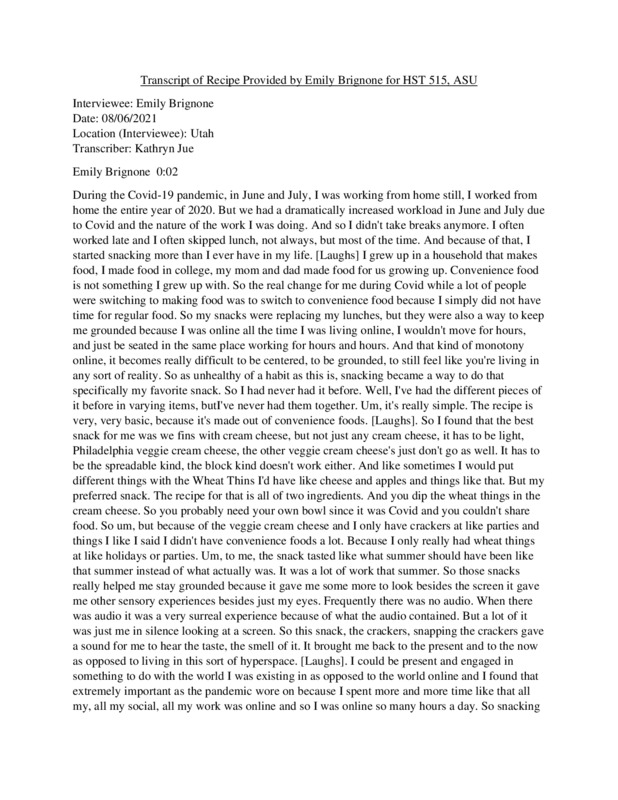
2021-08-06
While working from home I started snacking a lot as I frequently missed breaks and lunches due to the increased workload I also tended to work later than before so while I had no commute I stopped working around the same time I would have gotten home if I had been in the office most of June and July. I found snacking was a way to stay present in the physical world while living almost exclusively online during work hours and frequently replaced or at least supplemented some very hurried lunches. My favorite snack I had never tried before but it was suggested to me by someone who later passed from Covid and so now reminds me not only to be grounded but of them. My favorite snack is really simple but was new to me: wheat thins with light veggie cream cheese. It tasted like what the summer should have been instead of what it was. It was also a shift for me since I didn't eat a lot of convenience foods before COVID I took the time to make food so the idea of creating little snacks to replace generally more nutritious and regulated food was new to me.
-
2021-08-03
Homemade recipe of Carbonara for my son's tenth birthday, with all the restaurants closed, we improvised.
-
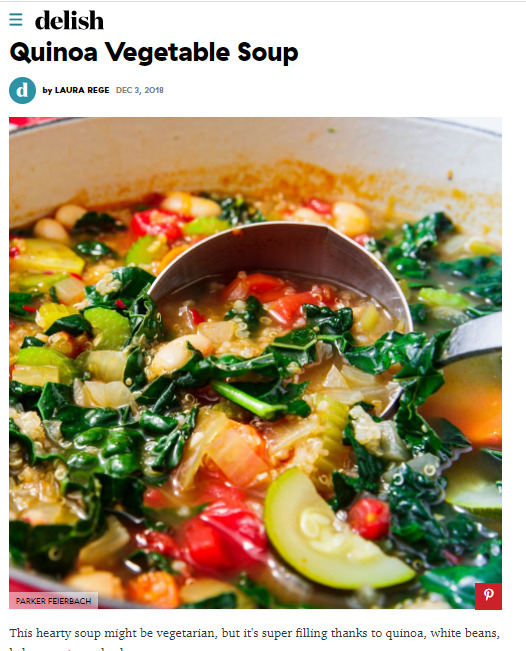
2021-08-02
When the Pandemic first broke out, I was concerned that I would catch the virus since I was working in an elementary school at the time. I thought of various ways to boost my immune system and I thought making healthy soups sounded like the best idea. I looked through the internet and I found this healthy quinoa soup recipe. I tried it and absolutely loved it. It was savory, hearty, and contained a rich blend of rustic flavors. This dish became one of my favorites throughout 2020 and I still cook it from time to time. For anyone looking for a healthy way to fight the virus, I recommend this recipe.
-
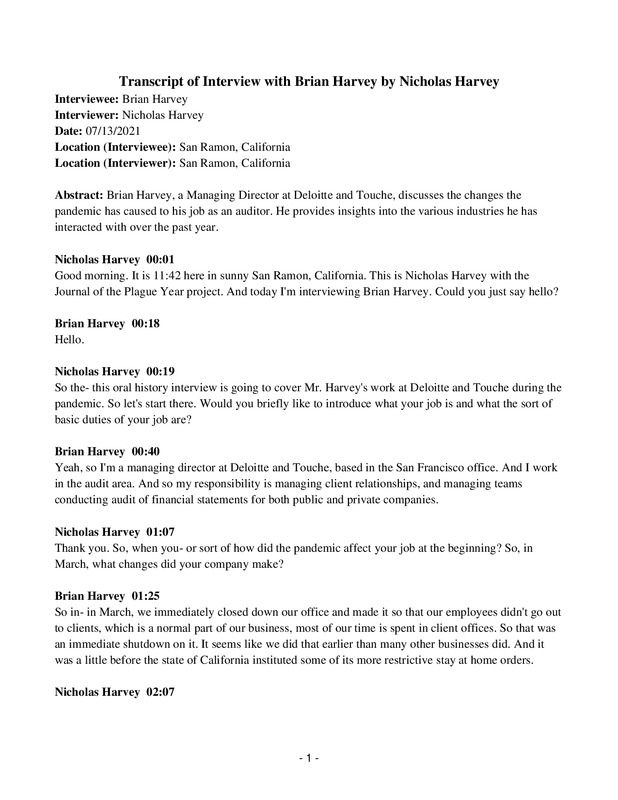
2021-07-13
Brian Harvey, a Managing Director at Deloitte and Touche, discusses the changes the pandemic has caused to his job as an auditor. He provides insights into the various industries he has interacted with over the past year.
-
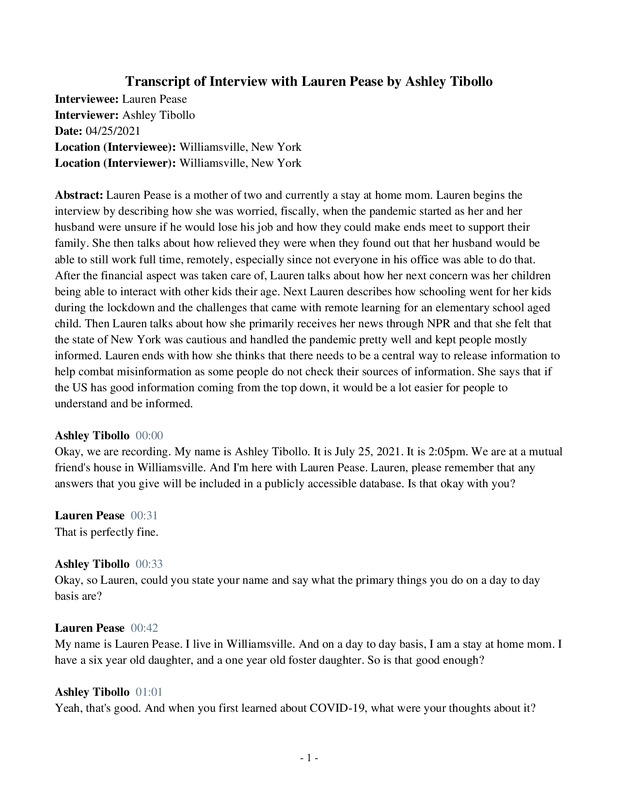
07/25/2021
Ashley Tibollo interviewed stay-at-home mom, Lauren Pease about her experience with the Covid-19 pandemic. In this interview, they discuss her experience with the lockdown, her worries about the pandemic, and what life was like during lockdown with her foster child. This interview also touches on political protests, virtual learning and her husband's transition to working from home.
-
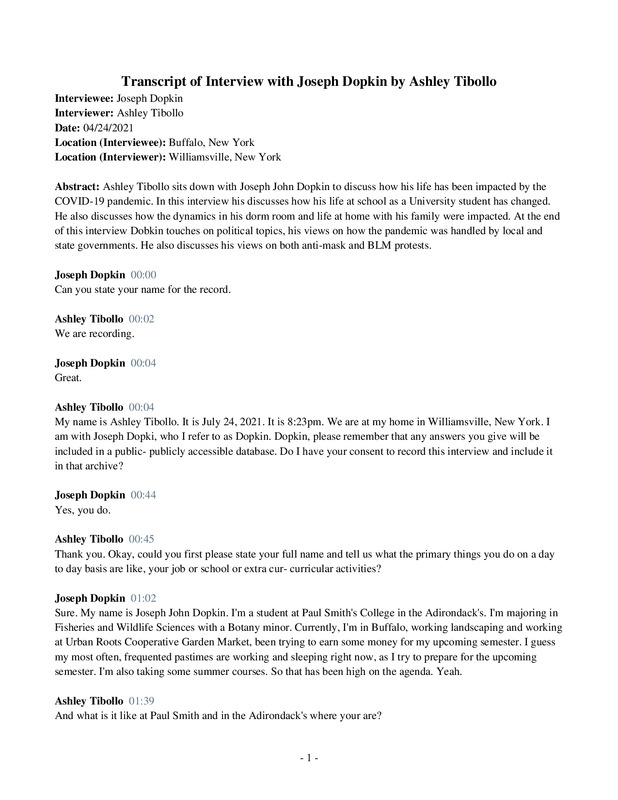
2021-07-24
Ashley Tibollo sits down with Joseph John Dobkin to discuss how his life has been impacted by the COVID-19 pandemic. In this interview his discusses how his life at school as a University student has changed. He also discusses how the dynamics in his dorm room and life at home with his family were impacted. At the end of this interview Dobkin touches on political topics, his views on how the pandemic was handled by local and state governments. He also discusses his views on both anti-mask and BLM protests.
-
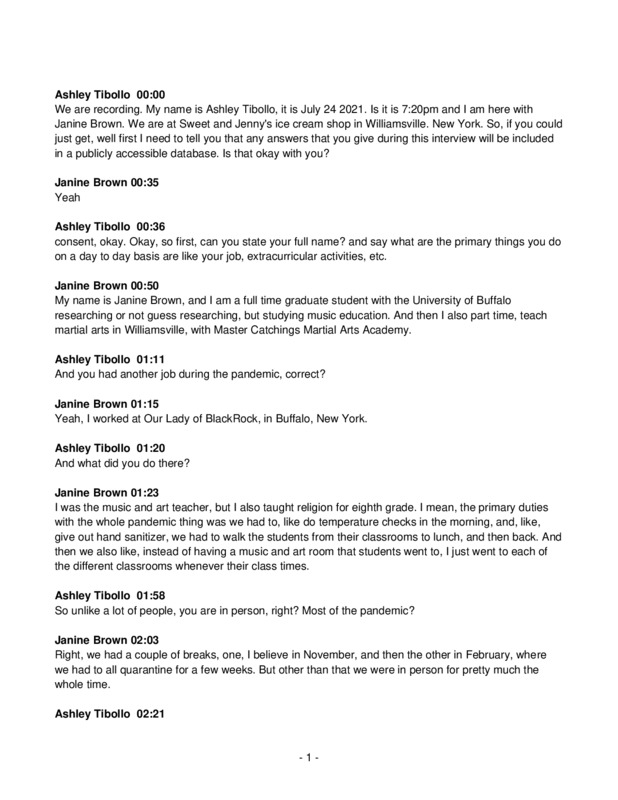
2021-07-24
In this two-part interview, Ashley Tibollo interviews Janine Brown on how her life was impacted by the Covid-19 pandemic. In the first part of the interview, Brown discusses how her last year of college was impacted and about her transition to remote teaching. She discusses her fears of the Delta variant, what sources she uses to get her information and what her feelings are regarding government action. She also discusses family life and how she was affected by the quarantine. She ends this part with her hopes for the future. In the second part of this interview, Brown discusses her decision to move in with her boyfriend right before quarantine and what it was life navigating a new relationship amidst a pandemic. She also discusses her pets and how their moods changed as her life changed. She discusses the difficulties of house hunting and the ways that the pandemic has affected the market.
-
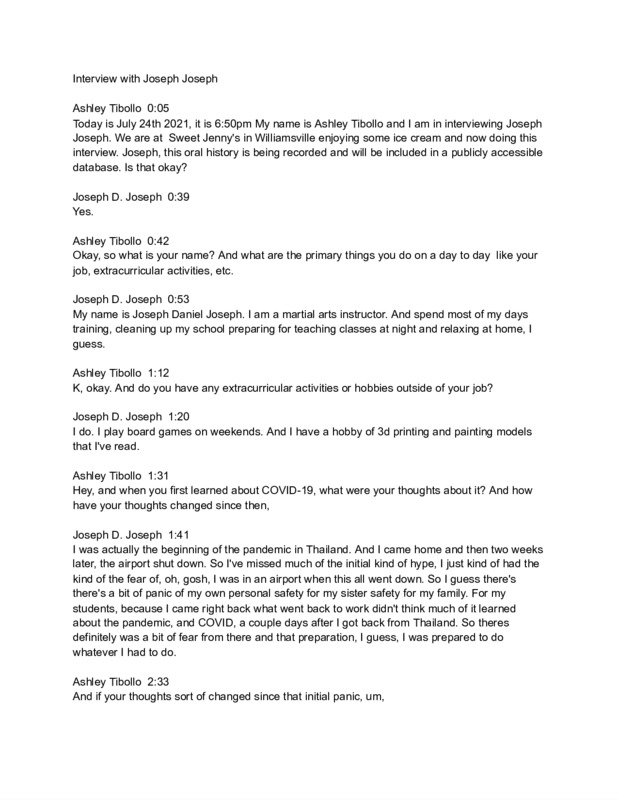
2021-07-24
Ashley Tibollo sits down with Joseph D. Joseph in an ice cream shop in Buffalo, New York to discuss how his life has been affected by the COVID-19 pandemic. In this interview, Joseph describes changes in his day-to-day routine, his life as a martial arts instructor, and changes in his economic status. He also discusses his students and how the pandemic affected them. In the last part of this interview, Joseph discusses his views on politics and what he hopes the future generations will learn about the response to this pandemic.
-
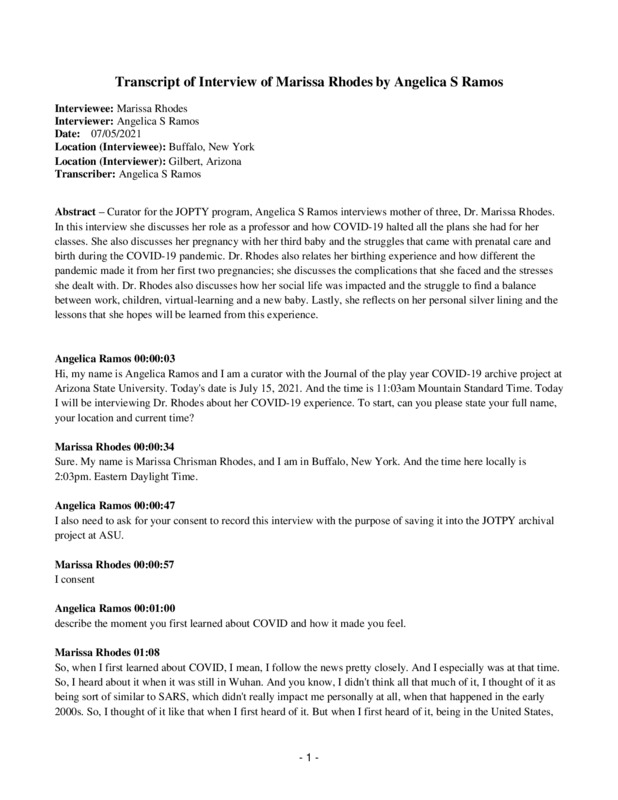
2021-07-15
Curator for the JOPTY program, Angelica S Ramos interviews mother of three, Dr. Marissa Rhodes. In this interview she discusses her role as a professor and how COVID-19 halted all the plans she had for her classes. She also discusses her pregnancy with her third baby and the struggles that came with prenatal care and birth during the COVID-19 pandemic. Dr. Rhodes also relates her birthing experience and how different the pandemic made it from her first two pregnancies; she discusses the complications that she faced and the stresses she dealt with. Dr. Rhodes also discusses how her social life was impacted and the struggle to find a balance between work, children, virtual-learning and a new baby. Lastly, she reflects on her personal silver lining and the lessons that she hopes will be learned from this experience.
-
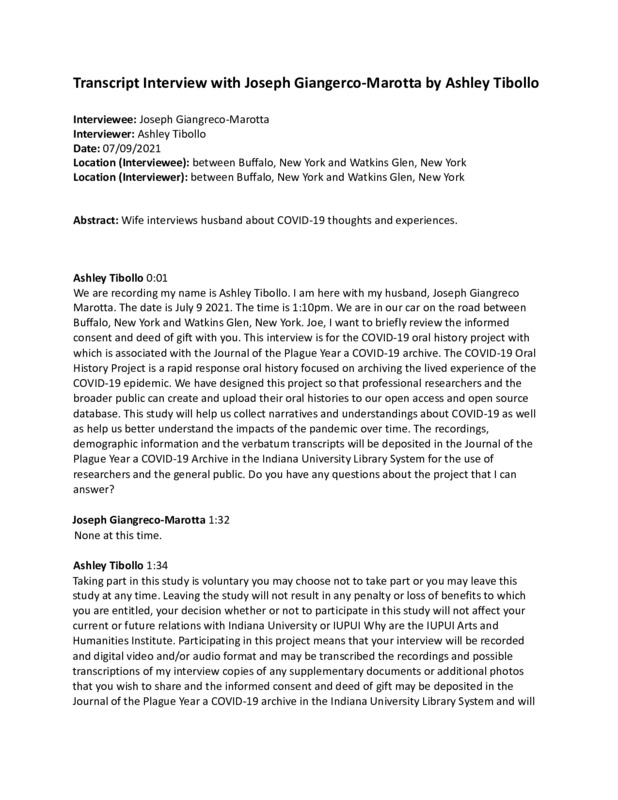
07/09/2021
Wife interviews husband about COVID-19 experience.
-
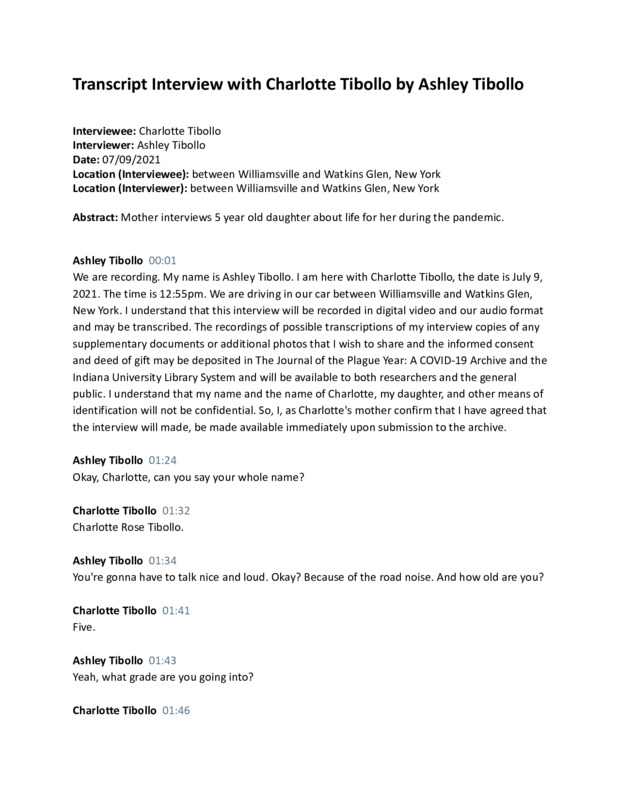
2021-07-09
Mother interviewing 5 year old daughter about the pandemic.
-
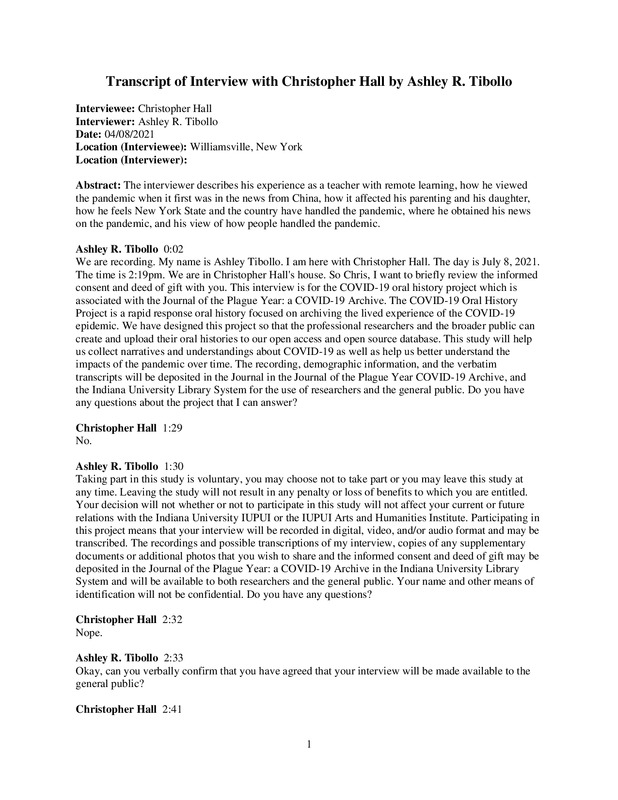
07/08/2021
The interviewer describes his experience as a teacher with remote learning, how he viewed the pandemic when it first was in the news from China, how it affected his parenting and his daughter, how he feels New York State and the country have handled the pandemic, where he obtained his news on the pandemic, and his view of how people handled the pandemic.
-
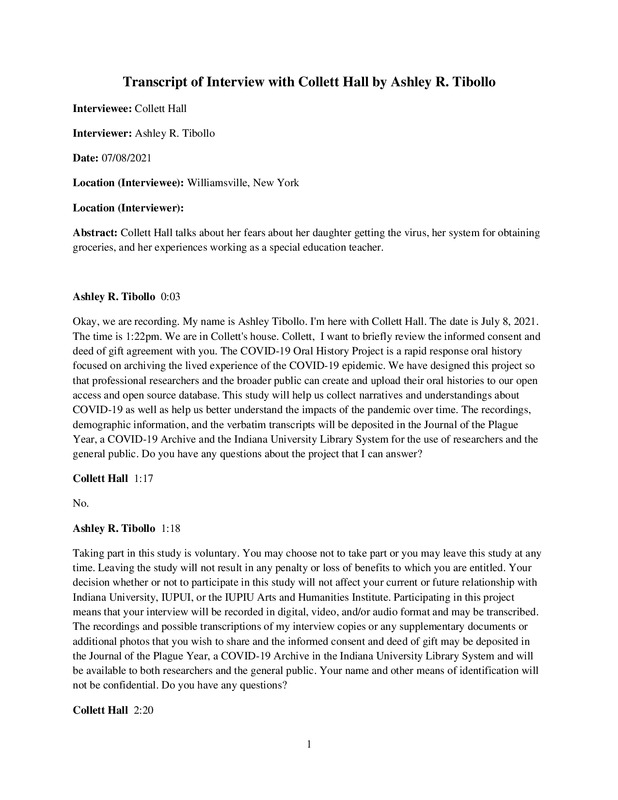
07/08/2021
Collett Hall talks about her fears about her daughter getting the virus, her system for obtaining groceries, and her experiences working as a special education teacher.
-
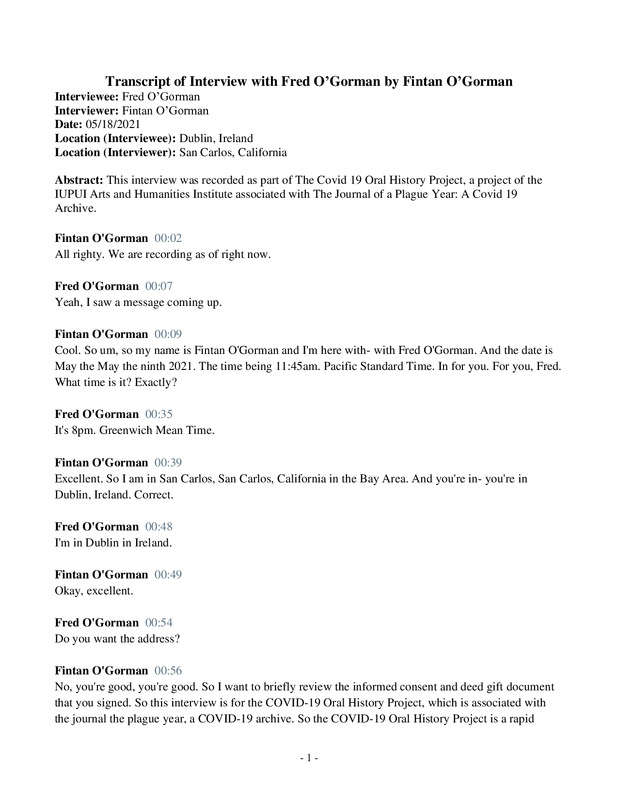
2021-05-09
Interview conducted by a nephew with uncle regarding the COVID response as it occured in the Republic of Ireland. Interviewee Fred O'Gorman discussed topics ranging from business closure and government response to personal and communal attitudes and behaviors in relation to pandemic in Ireland. The discussion also discussed ongoing vaccine rollout in Ireland and the dynamics of mental health through the course of the pandemic.
-
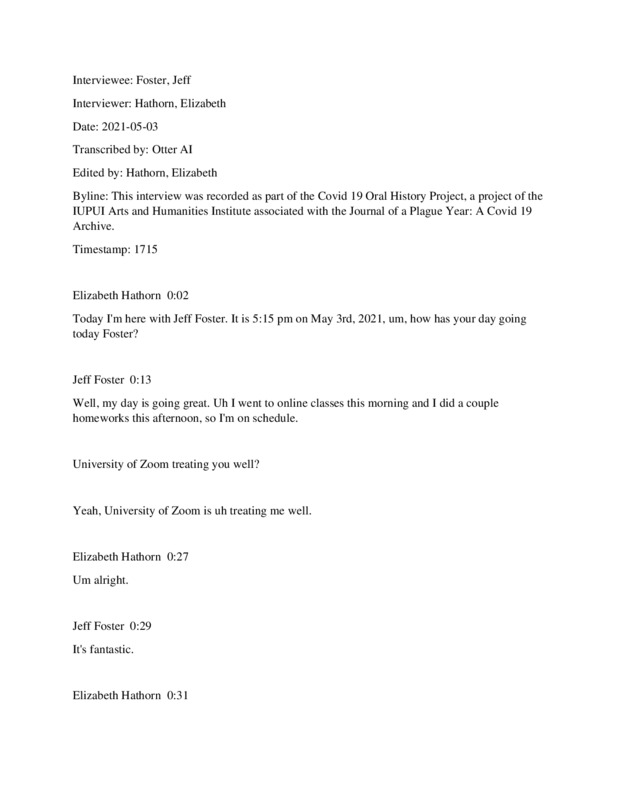
05/03/2021
Elizabeth Hathorn interviews Jeff Foster, a college student and member of the U.S. Army. He discusses the effects of COVDI-19 on college classes and on military training. He also touches on a few other aspects of life during the COVID-19 quarantine.
-
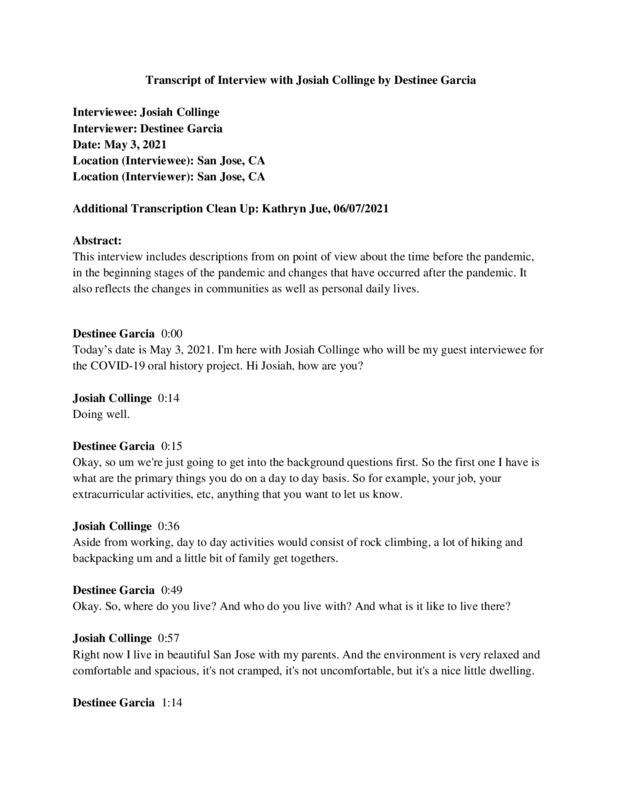
05/03/2021
The interview describes the life of a young adult before the pandemic and how it changed during and after the pandemic. It also discusses the significance of the pandemic to him and those around him.
-
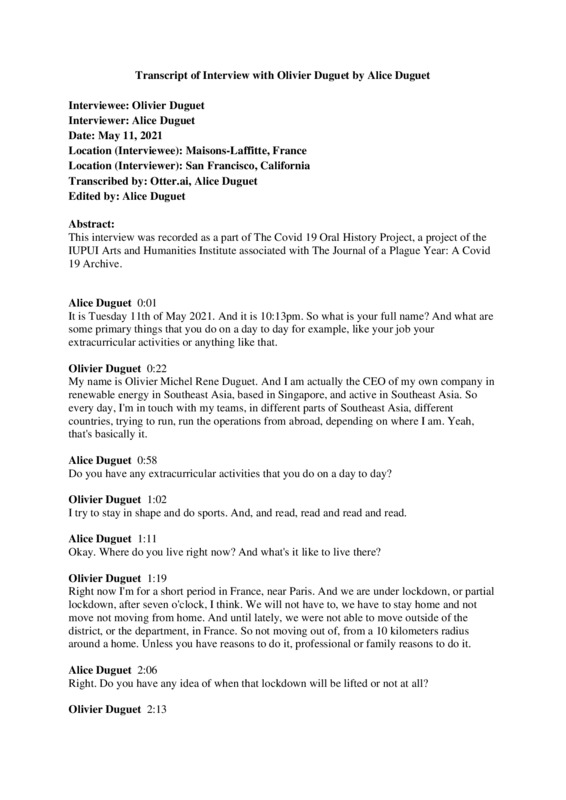
05/11/2021
As a CEO in Southeast Asia, the interview covers topics such as travel bans, new ways to work in the office, vaccinations, and compares government decisions in Europe and certain countries in Asia.
-
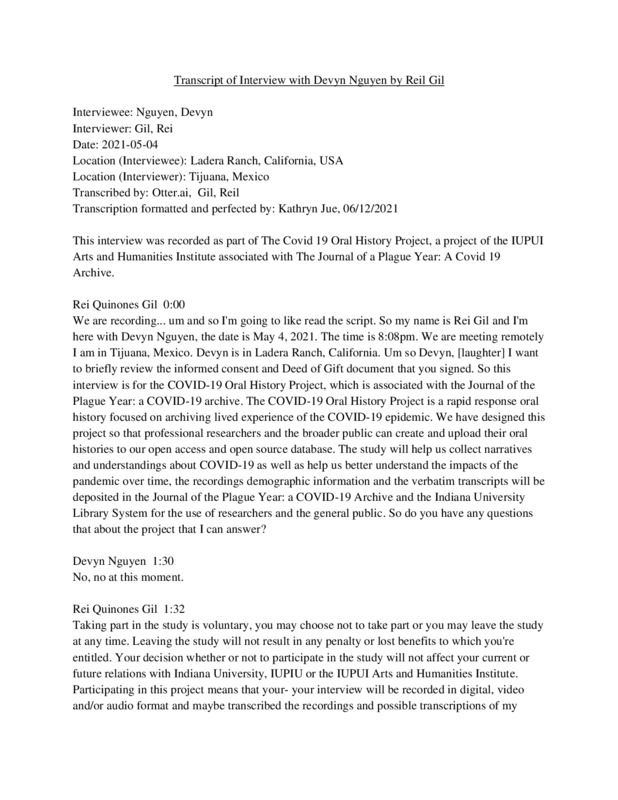
05/04/2021
Interviewee discussed what life is like graduating during the pandemic, working in a small family-owned business and the pushback against COVID safety in Orange County. She describes how the pandemic has brought her family together along with the tight-knit community with similar social values she has created.
-
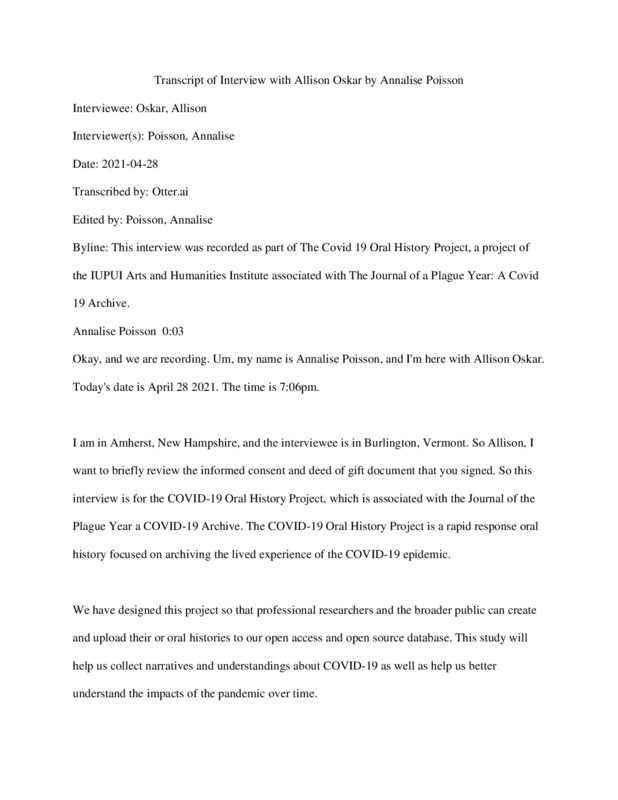
2021-04-28
This oral history focused on how smaller communities tackled the COVID-19 pandemic. The interview discusses how hospitals tackled the pandemic, and it goes into depth about what it was like to work for a hospital during this time. Also discussed were the ways in which the pandemic affected mental health and how it proved to be beneficial in some ways. There was a large focus on the ways in which COVID-19 affected the 'work life' balance of the interviewee.
-
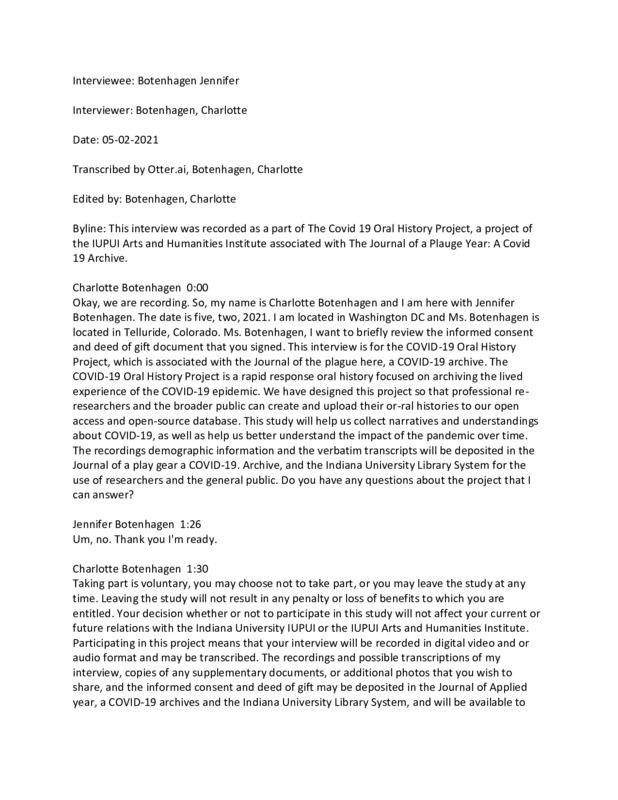
2021-05-02
This was an interview from Jennifer Botenhagen who is a preschool teacher living in a tiny mountain town. This interview details her experience adapting to teaching during the COVID-19 pandemic.
-
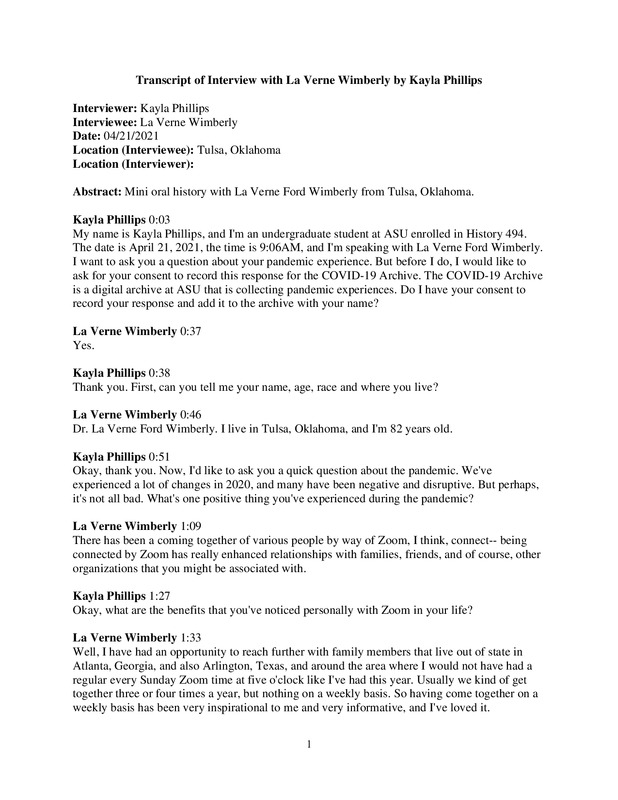
04/21/2021
Mini oral history with La Verne Ford Wimberly from Tulsa, Oklahoma
-

2021-03-31
This interview speaks about a teenager, Mohammed Husain, who has described her life through the course of the pandemic including how she has felt what she had experienced including some losses, things that have changed and ways she has coped. The set of questions provided are descriptive and offer directed questions that allow the interviewee to answer them thoroughly. Mohammed speaks about how she felt lonely during the pandemic. She describes things she has missed such as shopping going out with friends and effects on her mental health. She has also spoke about the limitations and how they have made her enjoy her own presence and made her evolve into a person who enjoys her own presence. She lists some positive aspects of the pandemic including closer relationships with family members along with a time to reflect on her own self. She has included that she has taken advantage of the time of the pandemic to really look back on her life and understand the moment as not everyone in their lifetime gets to live through such a scene.
-
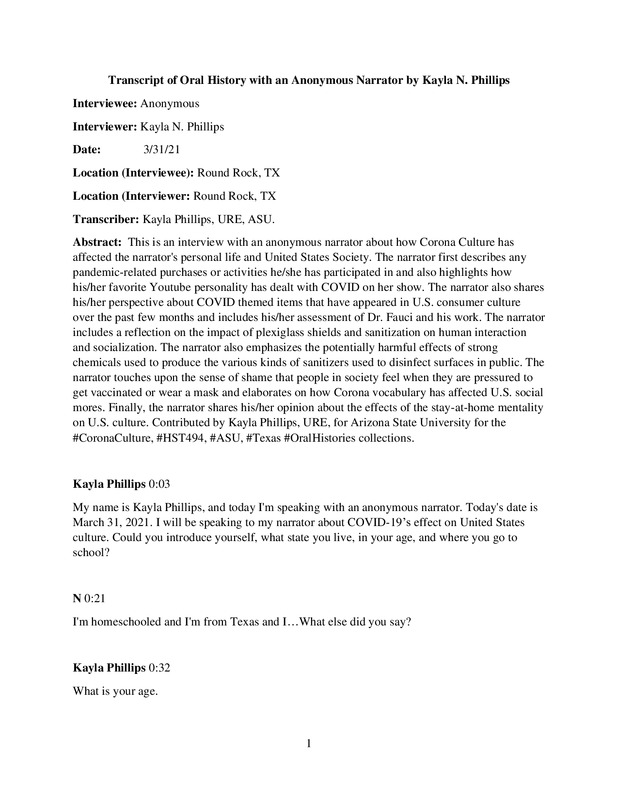
03/31/2021
This is an interview with an anonymous narrator about how Corona Culture has affected the narrator's personal life and United States Society. The narrator first describes any pandemic-related purchases or activities he/she has participated in and also highlights how his/her favorite Youtube personality has dealt with COVID on her show. The narrator also shares his/her perspective about COVID themed items that have appeared in U.S. consumer culture over the past few months and includes his/her assessment of Dr. Fauci and his work. The narrator includes a reflection on the impact of plexiglass shields and sanitization on human interaction and socialization. The narrator also emphasizes the potentially harmful effects of strong chemicals used to produce the various kinds of sanitizers used to disinfect surfaces in public. The narrator touches upon the sense of shame that people in society feel when they are pressured to get vaccinated or wear a mask and elaborates on how Corona vocabulary has affected U.S. social mores. Finally, the narrator shares his/her opinion about the effects of the stay-at-home mentality on U.S. culture. Contributed by Kayla Phillips, URE, for Arizona State University for the #CoronaCulture, #HST494, #ASU, #Texas #OralHistories collections.
-
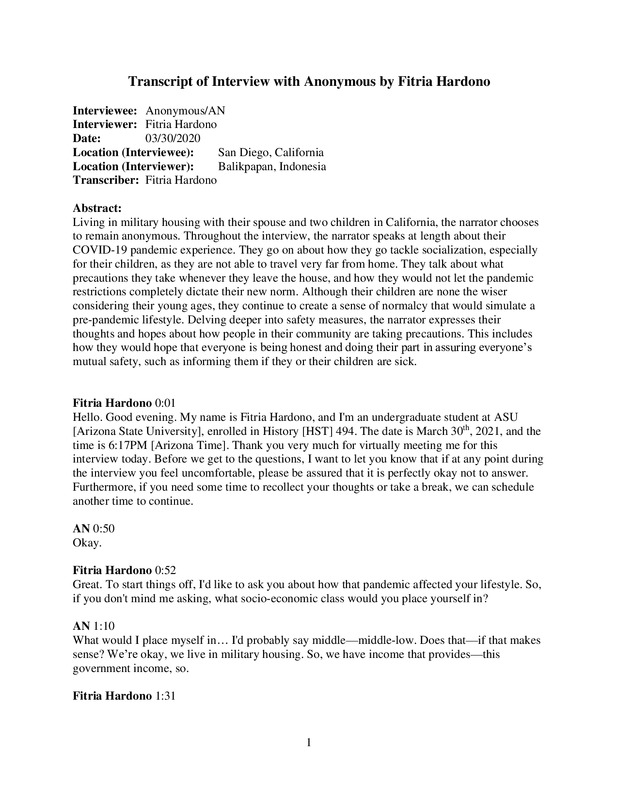
03/30/2021
Living in military housing with their spouse and two children in California, the narrator chooses to remain anonymous. Throughout the interview, the narrator speaks at length about their COVID-19 pandemic experience. They go on about how they go tackle socialization, especially for their children, as they are not able to travel very far from home. They talk about what precautions they take whenever they leave the house, and how they would not let the pandemic restrictions completely dictate their new norm. Although their children are none the wiser considering their young ages, they continue to create a sense of normalcy that would simulate a pre-pandemic lifestyle. Delving deeper into safety measures, the narrator expresses their thoughts and hopes about how people in their community are taking precautions. This includes how they would hope that everyone is being honest and doing their part in assuring everyone’s mutual safety, such as informing them if they or their children are sick.
-
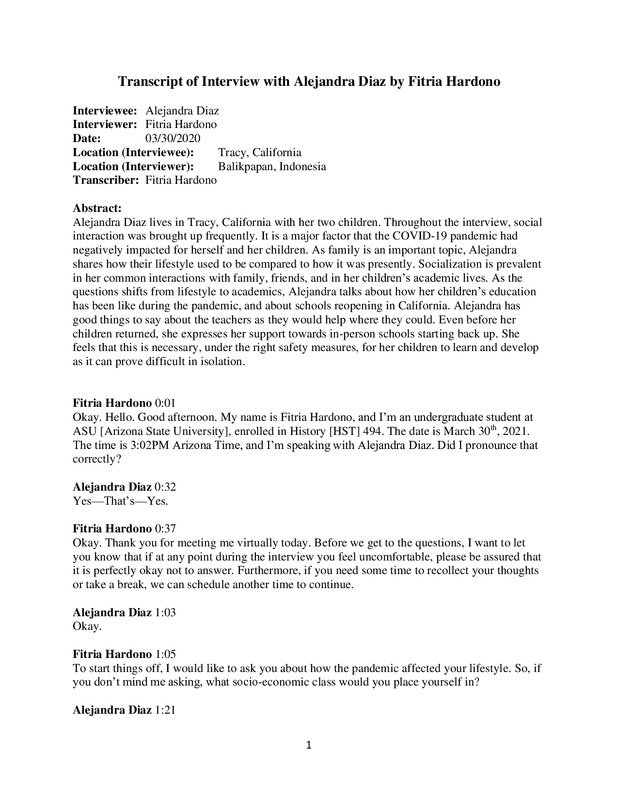
03/30/2021
Alejandra Diaz lives in Tracy, California with her two children. Throughout the interview, social interaction was brought up frequently. It is a major factor that the COVID-19 pandemic had negatively impacted for herself and her children. As family is an important topic, Alejandra shares how their lifestyle used to be compared to how it was presently. Socialization is prevalent in her common interactions with family, friends, and in her children’s academic lives. As the questions shifts from lifestyle to academics, Alejandra talks about how her children’s education has been like during the pandemic, and about schools reopening in California. Alejandra has good things to say about the teachers as they would help where they could. Even before her children returned, she expresses her support towards in-person schools starting back up. She feels that this is necessary, under the right safety measures, for her children to learn and develop as it can prove difficult in isolation.
-
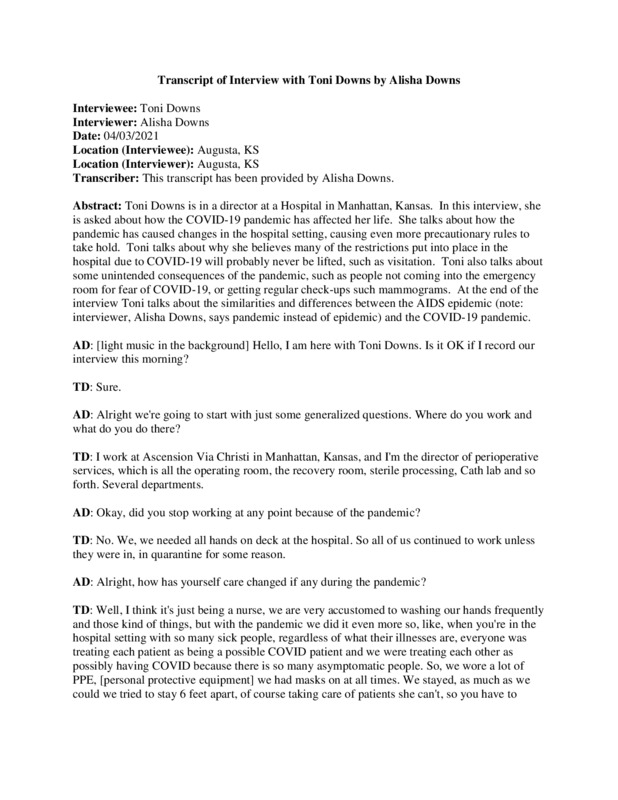
2021-04-03
Toni Downs is in a lead position at a hospital in Kansas. In this interview, Toni tells me about changes that have occurred at the hospital as a result of the COVID-19 pandemic. She also discusses the long term changes she suspects will stay in effect, such as visitation regulations to the hospital. Toni tells me about similarities and differences between this pandemic and the start of the AIDS pandemic. She also discusses how the number of people going to the emergency room have dropped significantly, more than 75% at the start of the pandemic. Toni believes if we all work together at stopping the spread, we will get this under control. However, she thinks many things may stay around for a while in the hospital setting, such as the before mentioned visitation rules, and even mask wearing, in order to protect hospital staff and the patients.
I am researching the unexpected consequences of the COVID-19 pandemic, such as people skipping mammograms for fear of catching COVID at the doctors office. I chose to interview Toni for my research, due to her insider knowledge of the inner workings of a hospital.
-
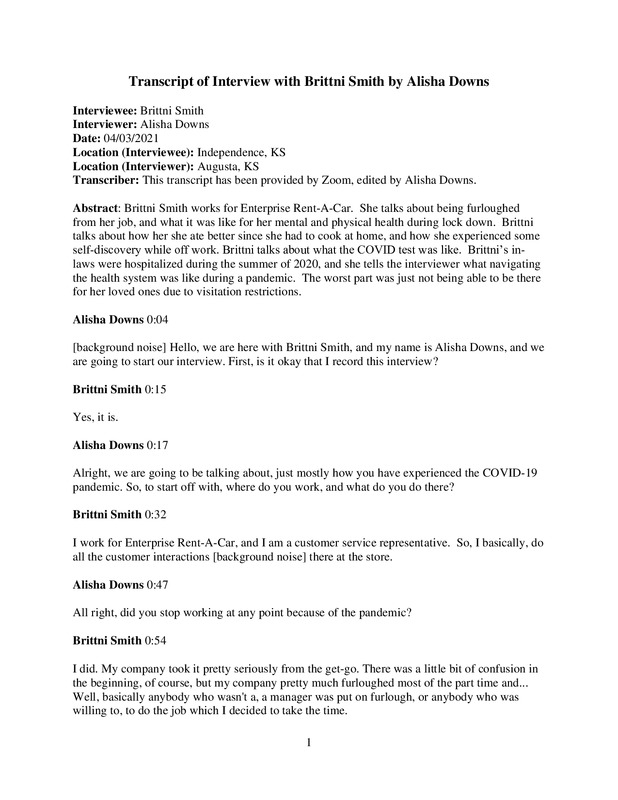
04/03/2021
Brittni Smith lives in a small town in Kansas. Here, I interview her about her experiences during the COVID-19 pandemic. She talks about what it was like getting a COVID test. Brittni also tells me about what it was like to have family hospitalized during a pandemic. Her work furloughed her for a few months at the beginning of the pandemic, which she also tells me about.
I am researching the unexpected consequences of the pandemic; a good example would be people not going to the doctor for checkups for fear of catching COVID. I interviewed Brittni for this research.
-
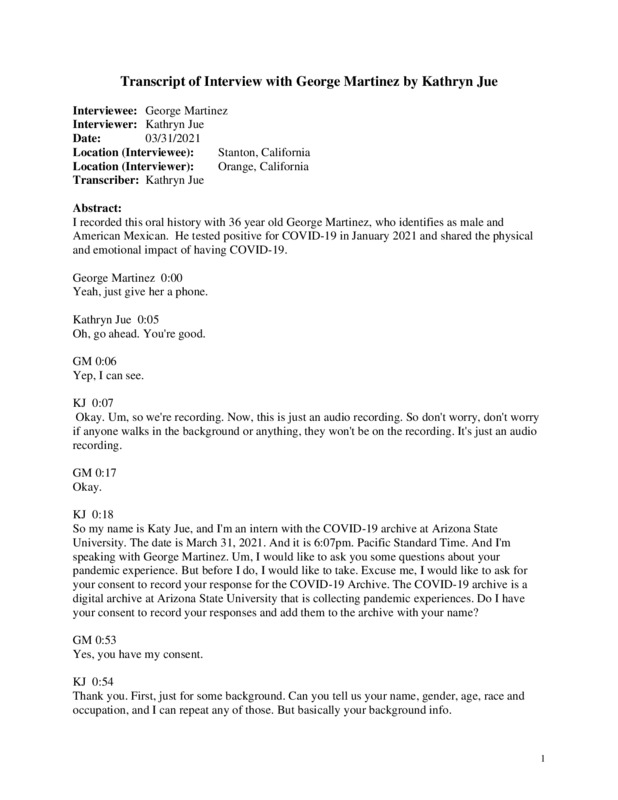
03/31/2021
This oral history is with 36 year old George Martinez, who identifies as male and American Mexican. He tested positive for COVID-19 in January 2021 and shared the physical and emotional impact of having COVID-19.
-
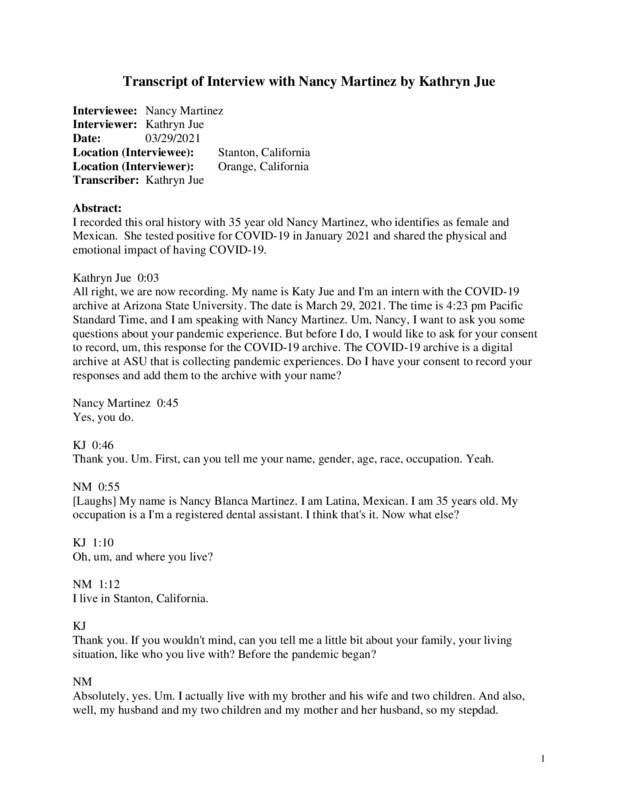
2021-03-29
This oral history is with 35 year old Nancy Martinez, who identifies as female and Mexican. She tested positive for COVID-19 in January 2021 and shared the physical and emotional impact of having COVID-19.
-
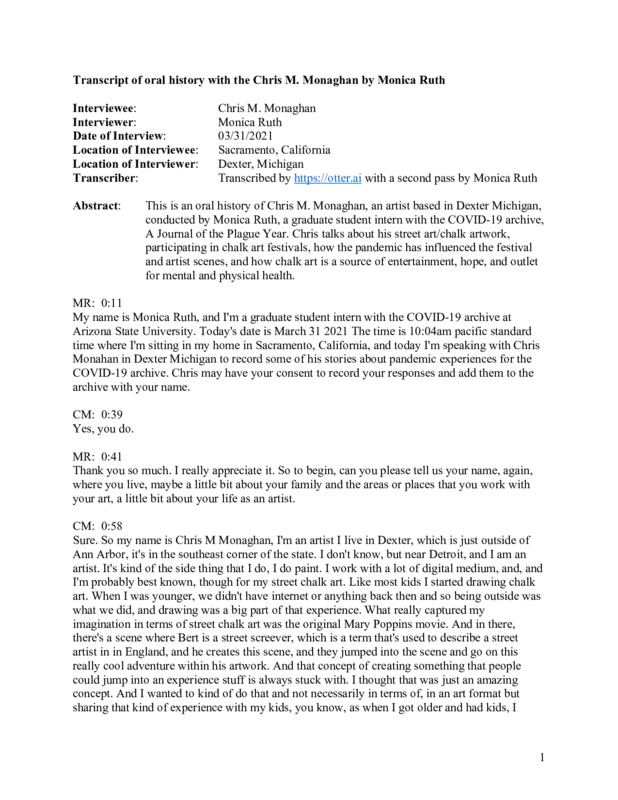
2021-03-31
This is an oral history of Chris M. Monaghan, an artist based in Dexter Michigan, conducted by Monica Ruth, a graduate student intern with the COVID-19 archive, A Journal of the Plague Year. Chris talks about his street art/chalk artwork, participating in chalk art festivals, how the pandemic has influenced the festival and artist scenes, the sense of community in chalk art, and how chalk art is a source of entertainment, hope, and outlet for mental and physical health.
-

2021-03-21
James Rayroux 0:01
My name is James Rayroux, and I'm a graduate student in global history at Arizona State University, and I'm working as a curation intern with the "Journal of the Plague Year" COVID-19 archive. Today is March 21, 2021, and it's just after 8:12pm or 2012 hours here in Arizona. I'm speaking with a narrator who wishes to contribute to the COVID-19, archive anonymously. Sir, I first want to thank you for speaking with me and contributing to this COVID-19 archive. Do you consent to having this interview recorded, transcribed, and immediately posted to the "Journal of the Plague Year" COVID-19 archive, where it will be made accessible to the public?
Anonymous Officer 0:43
Yes, I do.
JR 0:44
Thank you again for agreeing to speak with me and making time for this interview. In lieu of your name, or location, can you provide a summary of your background and professional experience in law enforcement?
AO 1:01
Sure, I've been sworn law enforcement for almost 23 years in a state in the Rocky Mountain region. I've worked both for municipal and state government, and I work for small to medium sized agency now about 35 sworn officers. I'm a military veteran, I was US Navy prior to my time prior to going to the police academy, and I worked a variety assignments from patrol to drug and alcohol enforcement, auto theft Task Force, Joint Terrorism Task Force, supervision, criminal investigations, and command.
JR 1:44
During that time what are some of your most prominent or important achievements within the law enforcement profession?
AO 1:54
You know, I think that this profession, namely, is typically not about the individual. I would probably point towards successes in the community and successful team building and successful growth of individuals into the business. I think one of my most proud achievements I think, something I'm tremendously, I feel tremendously accomplished for is somehow I failed to convince my son to be a firefighter, and he was just sworn in at another municipality in the same state as a sworn law enforcement officer. So while I have failed him and trying to convince him to do literally anything else, I'm also extremely proud and accomplished that I have raised my son into a similar professional lineage, and he's elected to take the oath to protect his community, as well.
JR 2:57
What are your current roles or assignments within your organization?
AO 3:04
I'm currently assigned as a patrol supervisor, a watch commander. I supervise a shift of a number of police officers and currently working day shift. So in those roles, I'm essentially the emergency manager for our smaller community, supervise police response to emergencies, meet with the public, interact with command staff, meet with public stakeholders, and then, essentially, a customer service rep who happens to be a sworn law enforcement agent.
JR 3:37
When and how did you learn about the SARS-CoV-2 virus in early 2020, and what were some of the first conversations you remember having about it at work?
AO 3:51
So COVID became on the tip of everybody's tongue probably in early January. And previously, in the end of 2019, it was somebody else's problem. It was, it was a China problem, it was a Wu Han problem, specifically. It was, it was out of sight out of mind. And, of course, you'll know this about law enforcement, there's only two kinds of problems in law enforcement, those being "my problem," and "not my problem." And during the first part of 2020, it wasn't our problem. There was a limited amount of cases in the US, they trickled in. Most of what we understood about the virus that causes COVID-19 was based on the media, was based on, you know, what you might catch a snippet of on NPR on Fox News, which has no news about foxes, I might add, and essentially, just the snippets we would get on the media and I don't remember having official tangential conversations about the COVID-19 virus in a strategic way, until probably February. A lot of those initial conversations, you know, as, as trained observers and trained investigators, I know many, many law enforcement officers who don't immediately give a lot of trust or credence to things their government tells them. So, for the first little while, it was kind of an attitude of scrutiny, one of a lack of credibility. We weren't really sure whether this was hype and whether there was really any risk, and there was a lot of conversations about the corollary between, you know, the standard flu and other illnesses that killed just as many if not more people, and there was a lot of disagreement about their trajectory, and the volume, and the scope, and really how this thing was going to manifest.
JR 6:04
How did your agency first deal with the COVID-9 pandemic in an official way?
AO 6:12
The first steps that were taken initially, mostly just surrounded, strategic outward facing changes to how we did business on the street, basic social distancing, wash your hands, don't touch your face, basically just mimicked CDC advice. You know, be careful more to come. Very low level, very basic, no real operational changes, no testing, no recommendations for symptoms that was, you know, under the umbrella of "flatten the curve," keep yourself healthy sort of jargon, that was shared from both the government and from the administration of our, our small community downwards towards the police department and other, other trades in the region.
JR 7:13
What did your first pandemic briefing or roll call look and feel like after those changes were made? Where you and your squad entirely in masks for that first time, or was that yet to come?
AO 7:29
When the government of our state first mandated masks, there was specific legislation that excluded law enforcement. It was quickly decided that masks were recommended, but were not required initially. So there was this sort of juxtaposition and feeling out period in our community where not a lot of people wore masks. It was recommended. You were supposed to wear them when you were outside, you were supposed to wear them, you know, when you were in contact with others. The science hadn't really been affirmed. There weren't a lot of links to credible research yet. And, of course, a pandemic of this nature has never been experienced or dealt with for generations previous to this. And so, you know, I'm 100% cofident telling you that literally everyone was just winging it, and that was immediately apparent in that first briefing where we discussed what we were going to do. Still scrutiny, still somewhat lack of credibility, lots of, lots of eye rolling with a few critical and strategic thinkers, you know, raising, you know, what would later be the first semblance of some alarm, saying, "Hey, you know, maybe, maybe this is going to be a big deal. Maybe we haven't experienced anything like this before, we ought to be as careful as possible."
JR 9:03
How did your agency's policies and procedures change over time after that initial effort?
AO 9:13
So the, you know, the, the tide came in, in a big way very quickly. And as you'll remember, as the COVID-19 virus, sort of sieged Italy and New York and the Eastern Seaboard, everybody started paying attention in a big way. And we're, you know, a couple 1000 miles from there, but local and state governments started reacting very, very quickly. Masks were mandated for all persons in contact with the public. A scramble was afoot to obtain PPE [personal protective equipment], which supply chains being, you know, any resemblance of the way they were in 2019, there was no problem. You just got on Uline or Amazon or, you know, you know, whoever your main commercial supplier was, and you ordered them by the skid and PPE was readily available and there was no reason to hoard it. But all of a sudden, there weren't any. There wasn't any, the supply chains were just curb-stomped into this sort of perpetual waiting period where nobody was sure what they were going to need, and everybody thought that N-95 respirators were the new hotness, and everyone had to have some from car dealers to people working the drive thru to baristas to, you know, the guy doing my front end alignment. So all of a sudden, we were trying to balance what was practically happening on the street, what our day-to-day call volume looked like, and what we were really supposed to do with the PPE we had knowing that our resupply was probably distant. And when we wove all that together and put all that minutia in a pot and stirred it up, what we came up with was pretty much this overwhelming sense of nobody knowing anything that was reliable. And it was anybody's best guess how long this was going to last and what we're going to need. That was echoed among our local hazmat [Hazardous Materials responders], our local health departments, our local health organizations. Nobody had any PPE to give us, nobody knew how long it was going to last, and nobody could have any real recommendations except for this sort of parroted, you know, don't touch your face, wash your hands, wear a mask in contact with everybody. Once masks were required, we had some pretty significant changes to the way that we did business in the community. You know, as a forward facing law enforcement agency, we contact, you know, one officer might contact 10s of people every day, sometimes might make 15 or 20 contacts before, you know, the afternoon's said, and by doing so, what we know now to weave a fabric of a contact trace that is essentially impossible. I mean, we remove Degrees of Separation all day long just by talking to people. And none of that technology and contact tracing and science had really entered the social jargon. But we were out there just trying to be as careful as possible, and it wasn't until probably...probably late March is when you know rivers turned to blood and the sky fell as far as the government was concerned. And it was then that definitive, codified changes were made to procedure where there was a moratorium put on traffic enforcement and all proactive street contacts, except for egregious emergency violations. We didn't make traffic stops for weeks. There was a moratorium immediately placed on warrant arrests and on booking people at the jail because, having a potential infectious patient in your vehicle, nobody knew what the consequences of that were or how to decon [decontaminate] it. So we didn't arrest anybody. If it was a crime of violence, or a crime against a person with a victim, we would screen it at the jail first. Everybody warned N-95 mask, and we would transport them as quickly and safely as possible. If it was a warrant for anything nonviolent, warrant for bench warrants, and courts and anything, we just let them go. Even if somebody told us that they had COVID symptoms, or were COVID positive, there was still no viable testing in the system, and no way to confirm or deny that those statements were true so we didn't book them. So many suspects in cases either went uncontacted, cases were dismissed, or the warrants were skipped just because the precautions weren't in place yet, and the agency and all the businesses and other agencies we worked in the region were trying to just to stay healthy. Proactivity probably took a, I think, I would call a permanent shift. I have not seen a resurgence of practice enforcement and the likes of which I might like. Cops just stopped doing business the way that they used to, and some of the badges we'd wear and some of the honor that we took in protecting the community came from making contacts: suspicious vehicle, suspicious people, you know, local transients, patrolling, you know, bike racks and stealing cars and stealing bikes and harassing people and it, it turned into kind of this proactive wasteland where law enforcement was worried about exposing themselves. They were worried about exposing each other. They were worried about exposing their families. And they were worried that if they happen to make a contact, they might expose the next people, the next 10 or 15 people that they talked to that day. So the only way to eliminate that was just to stop doing it. So by eliminating, you know, the patient zero style traffic stops, we hoped to have an impact on that, and flatten our own curves by just not talking to anybody unless it was an emergency.
JR 15:38
Do you remember the first call or the first contact that you went on where you and the public were both wearing masks?
AO 15:51
I don't remember it specifically. But I remember a handful of contacts that were made in right around March when, you know, when I said that when the king tide came in with news and with panic and fear. And I remember a handful where nobody really was sure what to do. Everybody was, had this sort of weaponized social distance, and people would walk the other direction when you tried to talk to him, and we hadn't mastered the, you know, the little elbow bump or the little nod, and so nobody could figure out how to talk to one another, and there was quite a few instances of the COVID card being played where people just simply didn't want to talk to the police. So they, they feigned fear and panic for exposure and wouldn't come out of their homes and open their car doors or their windows. And then shortly thereafter, it became socially stigmatic to participate in the fear and panic. And if law enforcement didn't wear masks, we sort of became this pariah immediately. So it was, it was optional for a very short period of time, but then very, very quickly, virtually every single contact we made had to have a mask on, of course, which, you know, brings with it all the problems associated with not being able to see somebody's face. It's hard to hear, it's hard to talk on the radio. It's hard to smell intoxicants, you know, it just added sort of this, it was basically like dimming the focus one click on your whole world by having to cover your face. But, you know, at that point, some of the science was starting to become more consistent and more published, and every, most everybody at that point was pretty convinced that at least when in contact with the public and the unknown, that some sort of mask was viable and necessary.
JR 17:50
In Western society, handshaking has long been a very important social event. And that's obviously gone by the wayside with the general public since the pandemic began. In lieu of having that physical contact to make direct human connections, how have you tried to establish rapport with the public when you do have to contact them?
AO 18:21
It's been weird. You know, handshakes have been sort of the status quo of a show of respect and humility for so many years. I mean, you know, you hold your hand out, it's almost instinctual. It's almost primordial. You know, in this culture in Western culture, someone holds your hand out, and you don't take it, like, them's are fighting actions, right? So it's, it was weird. We had to figure out ways to break the ice, we had to figure out ways to do that acknowledgement, and I'll answer it two ways. The first way was we had to figure out how to communicate with people even though they couldn't really see our faces, and there could be no sort of context to breaking sign of respect, like the handshake. So you know, you come up with this weird elbow bump, or you give the little, you know, the little nod that one bro gives to another across the urinal, and you find out ways to just break the ice with people. And the second challenge that we experienced was that we could no longer show those signs of respect to one another in view of the public. So if one cop was touching another, or, you know, giving a little handshake or playing grab ass, or high five, or even just a fist bump, all of a sudden, we were cast out, right? All of a sudden, those little, that that lack of social distancing became this socially virtuous thing to exploit and to ridicule, and so we had to be exceptionally careful in public even though within shifts, we considered our shifts to be close contact circles. I mean, any sworn law enforcement officer working during the COVID shutdown very likely saw their shift mates more than they saw their blood families. And so there was just no way to socially distance internally at work, because of the, just close knit manner in which the job is done and the proximity we had to one another throughout the day. Yet in public, you know, we're in our own cars we're socially distanced, we got to have masks on, you better boil yourself between each contact, and you got to wear booties and a Tyvek suit and touch everybody with a little wand. And in the mix, I feel like our isolationism increased, and I feel like our bonds of society from a law enforcement perspective became even more tenuous. So, you know, one of the things I adopted was I started using my first name with everybody. I stopped using rank, I stopped using identifiers. I just told him who I was. I asked them for their first name, I use my first name, I tried to break it down. And I would always, you know, have these little catch conversations I do and I introduced everybody, and just try to acknowledge that this is a new time and, you know, you hear in the media and you see it a lot. And in every, every, you know, corporation, commercial for six months, it was, "in these trying times." So, that sort of became the catchphrase like, "Hey, in these challenging times, things are different. Here's the business I'm here to do. My name is so-and-so. We're trying to keep the peace, how can we be helpful?" And we interacted with all kinds of people. Some people thought it was a hoax. Plenty of, plenty of sovereign citizen scam-demick, plan-demick jargon being thrown our way. And then on the other side of that spectrum, were extremely scared, extremely isolated...people wouldn't come out of their houses, people were afraid to take a Grubhub delivery. People were, you know, boiling their utensils. And somewhere in the middle, law enforcement just kind of figured out a way to break the ice, and I think it's, I think it's going to be permanently different. And I can tell you that because the day before yesterday, I was on a burglary call where I talked to the informant. Without even thinking, I reached my hand out to shake his hand because he told me his name. He said, "Hey, thanks for coming. I'm so and so." And without even thinking about it, my mammal brain shot my hand out in a greeting. And it took him about five seconds of staring at me before I figured out that we just don't do that anymore. And it's super weird, but we, we're working around it.
JR 22:51
What do you miss most about your job or your daily work duties from 2019?
AO 23:02
You know, I don't know if this is going to be directly related to the pandemic. I think that in 2019, we were dealing with a community that understood what the rules were. Everything was, you know, we call it "pre-COVID," we call it "olden days," I don't know if we're ever going to return to those times, but cops are out there doing business in the community, and we were fighting crime and protecting people. And we were making this self sacrifice and serving our community and being forward facing and just eatin' meat and just leaning in just to get business done. And we did it no way that served our customer and served our client base. And I don't know any law enforcement officer who's been on the job for more than 10 minutes who doesn't do this because they love the community they work, or they love the service that they provide, or the people they protect. And I think we've permanently changed the way that law enforcement officers are viewed by their communities. I think we've done, and I say "we," I mean we as a culture, good, bad, or indifferent, have done irrevocable damage to the reputation of law enforcers in our community and the public trust that they must hold in order to be successful. And then all of a sudden, the communities "why nots" became really, really strong. And cops had to start making excuses really quickly about why we weren't the bad cops. And why we weren't doing this to violate your civil rights. And why we're just, we're just out there trying to do the job and just trying to, you know, serve policy and serve the constitution and it might not be about you and your mask. And I feel like this stigma, the social stigma became leveraged against law enforcement in a really big way without any real underlying facts. No one, you know, it just became this sort of socially virtuous stigmatic status to hate the cops, whether it was for their efforts to preserve the public peace in the pandemic, or whether it was your interpretation of their worth based on events taking place in the national landscape. It became cliche to hate the cops. And I think I miss, I missed the real relationships we had in 2019 that were based on sort of a shared respect, and a common understanding and actual virtues of character and integrity. And now, you know, it's, it's an uphill climb. We're sort of this Sisyphussian rock-pushing force, just always trying to push this public opinion and public trust rock up the hill only to, you know, take two steps back, and I miss that quite a bit.
JR 26:15
What do you wish that the public understood about law enforcement during the COVID-19 pandemic?
AO 26:27
I think if I could choose one thing, I wish that the public understood that nothing changed in the way that law enforcement supports and loves and wants to collaborate with the community. During the pandemic, law enforcement was shined in three or four different colored lenses varying from, you know, rosy to catastrophic, and most police officers on the street during the pandemic, were humans just trying to figure out how to navigate their space and provide for their families, and to continue to protect the public and somehow navigate shark infested waters of this, the sudden unknown COVID-19 enemy. And it was a huge struggle, you know, policy was changing on the daily. Science and procedure was being released several times a day at, you know, at its busiest, and most law enforcement were just caught in the wake of this rapidly changing information, hugely volatile work environment, and trying to keep themselves and their families healthy while still being effective. I wish the public knew how much most law enforcement officers hate racism and prejudice and corruption. I wish they knew that nobody hates dirty cops more than we do. And that virtually all the law enforcement officers they contact on the daily are still doing the job because they've considered the risks to their lives and their risks to their health and the risk to their family's health, and are still willing to suit up every morning or every night, and put body armor on, and put 30 pounds of gear on, and go out there and risk their health and safety to protect our community, and mostly people they don't even know and have never met. And I think that's what's really at stake when the rhetoric gets really loud and the disinformation gets really deep. And the panic and the fear really starts to grab older people is they start to lash out against the government as a whole and what they don't understand in, you know, in some way is that that uniform represents just another member of their same community who is trying to stand between the two entities and make good decisions, and protect the constitution and uphold the peace and protect the, you know, the victims and protect, you know, the weak from the oppression and you know, all the things we stand for. But all those cops out there are just the same community members. Some of them don't have any toilet paper at home. Some of them couldn't buy peanut butter. Some of them didn't have fresh food for weeks because they couldn't go to the grocery store because of their shifts. So it wasn't that there was this divide. It wasn't that there's this this pantheon of law enforcement officers who were out there trying to screw everyone, it was members of the very same community who just happened to put that uniform on by choice to save it and protect the community despite the fact that there was this, you know, this crazy pandemic and all the fear and panic going on at the same time.
JR 29:56
Knowing that I intended to speak with you about law enforcement and your experience in that profession during this pandemic, what, perhaps, was one of the questions that you hoped to answer or that I didn't ask?
AO 30:18
One of the things I was thinking about talking about was that, for the first several weeks, I would say maybe even two months, there was no viable testing for any first responders in our region. So if one of my guys or gals was symptomatic, they simply had to be quarantined, and there was no way to test. We begged and borrowed and pled, and, you know, by hook or by crook, tried to figure out how to make a relationship with a clinical entity so that we could protect our people and keep them in place and keep them effective and keep them assigned on the street. What happened was any flu-like symptoms were just viewed as COVID quarantine, and so there was a couple of days there where I almost didn't have an emergency dispatch center because I didn't have anybody to work. There was a couple of days where we were hemorrhaging overtime money paying the cops that were healthy to cover the cops that were not because we couldn't get them tested. It took quite a while until we had a viable, and until the turnaround was fast enough that it was sustainable to test people. Because if the turnaround was 10 days, and the quarantine was 14 days, and almost was you know, half a dozen, six of another, you were gonna stay home anyway. So until the testing was fast enough and efficient enough, we burned a lot of time, and a lot of cops sat at home for 14 days under quarantine who maybe didn't mean to, and there was no way to test them. Once testing was viable, and available, I feel like we did a better job of that. But at the beginning, there were several of us who were pretty sure we had contracted the virus and suffered its effects as early as January or February, a ton of us were sick in January and February and early March before, way before viable testing was available in our communities. And that was, that was a challenging and an alarming period of time where even my first responders we just didn't know. And if you weren't admitted to the ER, if you weren't seen clinically, and if you didn't have co-morbidities or other risk categories, you just didn't get tested because the resources didn't exist. And why would we waste a test on a first responder who can just quarantine for two weeks and be otherwise healthy when we need to use it on, you know, the septuagenarian co-morbid patient who's, you know, got 15 different ailments, and I understand that math. But it was pretty frustrating to just have to hemorrhage overtime money and just suffer and figure out how to cover shifts and work 16, 18 hours in a row because there just wasn't anybody else.
JR 33:23
I am incredibly grateful for your time and for sharing your expertise and your thoughts with us. Thank you so much.
AO 33:31
You're very welcome, sir. Thank you for the opportunity.
Transcribed by https://otter.ai
-

2021-03-20
James Rayroux 0:00
My name is James Rayroux. I'm a graduate student in global history at Arizona State University, and I'm working as a curation intern with the "Journal of the Plague Year" COVID-19 archive. Today is March 21, 2021, and it's just after 5pm or 1700 hours here in Arizona. I'm speaking with a narrator who wishes to contribute to the COVID-19 archive anonymously. Sir, I first want to thank you for speaking with me and contributing to this COVID-19 archive. Do you consent to having this interview recorded, transcribed, and immediately posted to the "Journal of the Plague Year" COVID-19 archive, where it will be made accessible to the public?
Anonymous Officer 0:39
I do.
JR 0:40
Thank you, I greatly appreciate you making time to share your experience with us. In lieu of your name and city, can you provide me with a summary of your background and professional experience in law enforcement?
AO 0:57
Yeah, I've been a sworn police officer for a little over 10 years in northern Colorado. I've worked for a couple different departments during that time. I started off at a small municipality, and at one point worked for a state law enforcement agency and then working for a municipality that has approximately 150,000-160,000 citizens within the jurisdictional limits of our department.
JR 1:25
Can you give me a summary of your life before law enforcement and what led you to police work?
AO 1:33
Yeah, so I grew up with a family of cops, a grandfather and two uncles who were police officers, so I'd always kind of had that in the back of my mind. When I was a teenager, I started working out with an alcohol and tobacco compliance team. So I would go in and attempt to buy tobacco and alcohol products underage to ensure that corporations were properly ID'ing the people who came in to buy those products. I studied criminal justice a little bit in college, although that's not what my degree's in. I went to a police academy and then worked at the departments that I previously mentioned. And then within the realm of police work, my emphasis has mainly been of a traffic safety, impaired driving nature, so that's where my expertise kind of lies within the realm of police work.
JR 2:38
What are some of your professional goals over the next few years, and where would you like to, what would you like to accomplish before the end of your career?
AO 2:50
My sights in the next couple of years, I'm currently working on a master's degree in organizational leadership. With that degree, I would like to promote within my department to at least the rank of sergeant. And like I said earlier, I work for a larger department. Previously, I came from smaller departments, and I kind of missed that small town feel, so eventually, I'd like to parlay that supervisor experience in my larger department into being a supervisor at a smaller municipality or a smaller county agency where I think I could bring both sides of working for a small agency as well as looking at working for a large agency to help a smaller agency, because they don't usually get a lot of super qualified candidates for the higher positions. It's kind of what is already at the department, which sometimes is great, and sometimes it's not so great, and I think that having somebody that just hasn't came up through that agency to bring some new kind of fresh ideas is really good for us. That's ultimately the goal.
JR 3:58
And when and how did you first learn about the SARS-CoV-2 virus in early 2020?
AO 4:08
Initially, I heard about it on the news, broadcast news, and then I visited enough websites, mainly Reddit, which is often called "the front page of the internet" that kind of started talking about it and how it was kind of on the West Coast. Obviously, Northern Colorado is more westerly in the US, than, you know, the middle of the country, and Denver, our biggest city in Colorado, obviously has an international airport, and there's lots of things that come through, so I kind of kept an eye on it. Also with the nature of my work, I come into contact with people of all different kinds of races, religions, sexes, creeds, orientations, all of that both, willingly and unwillingly, so I kind of kept my eye out and knowing that there could be a good chance that if it came to Colorado that I would be involved with it just because, traffic stops, disturbances, sometimes we have to take people into custody against their will if they have a warrant, or they're fighting us, so that's a really close contact, like hands-on situation. So I knew if it did get worse, I didn't expect to be this bad, but if it did get worse, that it'd probably end up affecting us in one way or another.
JR 5:22
Do you remember what some of the early conversations were like that you had about the SARS-CoV-2 virus or COVID-19, what those conversations at work were like or were about?
AO 5:36
Yeah, a lot of them were just kind of like, you know, this is just a really bad flu. As long as you, you know, sanitize your hands after you deal with people, which is a pretty common thing that cops do. I know, the majority of cops that I work with carry around a little bottle of sanitizer, either on their person or in their what we call a "war bag," a little bag that sits in the front seat that holds all our tickets and everything else we need for the shift. So it was initially just, you know, be smart. If somebody's sick, keep your distance if you can, wash your hands, sanitize. And then once summer comes in, because early it was spring, where it's still pretty cold here, that once summer comes, the heat will naturally kill it off, and it's not going to be anything worse than the normal flu was initially the talk around town.
JR 6:24
How did your agency first deal with the COVID-19 pandemic?
AO 6:30
So initially, we got multiple emails, kind of just updating it from what they've heard from the Surgeon General in Colorado that was disseminated to people higher up in the city side of our agency, with just tips, kind of like what I just talked about, wash your hands, you know, don't touch your face or mouth, sanitize your hands, sanitize your cars. And it was just kind of a more official version of what we all kind of thought, which was that it was just a worse flu as long as you, you know, stay at home with your sick, don't voluntarily interact with sick people, etc, etc, that it would be good and we'd be done by summer.
JR 7:13
At what point did your agency start encouraging or mandating mask use by employees?
AO 7:23
So I want to say early March is when the governor of Colorado put us on a statewide lockdown. So I want to say maybe mid February to late February, is when we got a order to make sure that we're wearing masks, if we're around each other, if we're going to be in somebody's house. They were saying they prefer it on traffic stops, but they know because of the nature of us standing in traffic and it's kind of already hard to hear that, that was kind of our discretion. But I want to say mid to late February was the big one. It's also when we stopped doing in-person briefings. We have a specific briefing room where our sergeants, commanders will talk to us about what happened earlier in the shift, what they expect of us tonight, just conversations about our shift in general that's usually done in a room. It was about that time that we move that outside. So we all just kind of stood outside our police department and ended it to be a little bit safer than being in the booking room. But even when we did that we still wore masks were outside doing our briefing.
JR 8:28
What do you remember or what did that first pandemic briefing or roll call look like when everyone showed up in, in masks?
AO 8:37
It was definitely interesting. You know, it's just something that you usually don't see unless you're in a hospital setting, which we obviously go to sometimes if we have bad car accidents or bad assaults. But again, even that's usually if the person is thought to have been sick or something else, where you're obviously not standing in the emergency or the surgery department. So it was a little bit different seeing everybody with these, at the time, surgical masks. We ended up getting given cloth masks and everybody eventually started you know, finding a mask they liked better, but initially, it was just paper surgical mask like you see at the hospital, so it was definitely a strange sight to see twenty cops standing around with their mask on.
JR 9:23
How have your agency's policies and procedures changed since that initial response in February 2020?
AO 9:31
Um, so as COVID kept going up and more and more cases and especially in Colorado, and especially Northern Colorado where there was a higher outbreak than the rest of the state, we got, I don't know the name of the product but it's essentially a super medical grade cleaning product that is so strong that you have to wear gloves and a mask anyway when you're using it because it can burn your hands and you don't want to inhale it. So we are given directives to wipe down everything we touch on our car. So steering wheel, driver-side door handles, radio mics, computers, shifter, etc, with that cleaning product both before and after our shift. And then our department also bought a bunch of small hand sanitizer bottles for everybody to carry with them. And then we had two big jugs in our, what we call patrol room where we type our reports, that we could refill those smaller bottles with. And then we were given a mandate to wear masks anytime we were in contact with somebody. And if we could, any calls that we were, we can, we would normally take in person, such as like a cold theft or something just for customer service reasons, if we're not super busy, we'll usually go to that person's house and just get their statements so they can have a face-to-face contact. We were given a directive, though, to do all that over the phone as much as we can. So there would be nights that just wasn't a busy in-progress night, and I would take fifteen calls, all from my car parked in a parking lot somewhere. So after a decade of doing this, that was a big difference in what I was used to.
JR 11:12
For the benefit of the audience, can you explain what a cold theft report is?
AO 11:17
Yeah, so a cold theft report is if somebody came home from dinner, and let's say their son, their twelve-year-old son left their bicycle just outside in the front yard leaned up against the house, they get home and that bike was gone. And they don't have any kind of surveillance systems, you know, they weren't home when it happened, so they know that something was stolen, but they have no idea of exactly when, no real description of who might have taken it, and we call that a cold theft. It just means that it's not something that's in-progress. Like if somebody were to call and say, "Hey, you know, there's actively a fight going on right now at the mall." Um, that would be an in-progress call, or a hot call is what some people call it. Anything cold, so a cold theft, a cold burglary, a cold auto theft just means that it's something that's not actively happening, and they don't really have much information to go on.
JR 12:05
Thank you. Do you remember what your first inperson call was after you began wearing masks, and maybe your first call after the public started wearing them as well?
AO 12:19
I don't recall the specifics of either. I know that there was a couple calls I went to when you know, we were mandated to wear the masks. And you know, police officers still have freedom of speech just like everybody else does. But, you know, working for any organization, whether public, like the government or private, you still follow the rules and policies, procedures of your police department or your, your company. In this case, my police department or my company said that, you know, there's a new policy that we'll wear these masks. So it was weird, because there are some houses we go to where we would talk to people in-person and, you know, they'd be like, "Well, this is dumb. I don't know why you're wearing this mask. This is essentially the flu, why would you wear it?" You know, I'd have to be like, "Well, you know, my opinion on it is irrelevant. At this point, I'm here for a reason, but my boss told me to wear this, and my department told me to wear this, and that's why I'm doing it." And then we get the opposite where we go somewhere, and we would have the mask on and so would they and they're like, "You know what, I'm really glad that you guys are taking this seriously, and, you know, there's a lot of people that aren't." At that point, they're happy so I'm not going to say anything to change it. But you know, we would give people a mask that would ask us. "I'm glad you guys are doing this. Do you think this is as bad as it is?" And I would say, "You know, well, my again, my opinion on it's irrelevant. My boss told me to wear this mask, my department told me to wear this mask, so that's why I'm wearing it. Anyway, how can I help you with the reason that you called today?"
JR 13:53
Has the pandemic changed your sense of security around fellow cops or fire crews or EMS personal?
AO 14:02
I don't know if it's so much has changed my sense of security. I know it's changed things that we've, we've done things a lot different. It's not uncommon for police officers and my agency or anywhere across the United States to also be dispatched to fire medical calls. And we provide what's called scene security. So firefighters, a lot of them also double as paramedics and EMTs. And obviously EMTs and paramedics are those things. They have a job to do, and that's you know, rescuing people or providing life saving medical intervention on people. And sometimes especially if it's drug or alcohol fueled, there can be other people on scene that are concerned or upset and they want to get involved with it. And so law enforcement will get dispatched to assist with that and make sure that the scene is safe or secure, so that the firefighters and EMTs can do what they need to do. And usually we'd always go to those. It changed a lot where if somebody was COVID-19 positive or had symptoms of it, and it didn't seem like we needed to be there, we would go to a lot less of those just to keep our officers safe and not put them in unnecessary danger.
JR 15:11
Has the COVID-19 pandemic affected your process or procedures for detaining, arresting, or booking suspects or arrestees?
AO 15:23
Not so much for detaining or arresting, those thresholds are met at certain times, and for various reasons. You know, so I've detain people before that, I don't think are alleged to have committed crime at that point. But because of their general behavior, or things they've said or things they've done it, they're detained from an officer safety perspective, so they can't hurt us, and they don't hurt anybody else. Obviously, I've detained people because I feel like they may flee from us, and, you know, I have a reasonable suspicion that they've committed a crime, and so they're going to get detained until we can figure everything out. So our department is really great about stressing as far as keeping yourself and your partner safe, nothing changes. So whatever you need to do to make that happen is fine. I work for a municipality, so our "booking standards" is what we call them, so what we can and cannot book people for is set by the sheriff of our county, who runs the the jail. Because of the COVID things, and obviously, you get inmates that are together in tight spaces, and there's a lot of them, he relaxed them, and essentially lowered the threshold of crime that it would take. So in Colorado, we have three different classes of misdemeanor with M-1 or misdemeanor-one being the highest and M-3, or misdemeanor-three being the lowest. Same with felonies, there's one through six, one is the highest sixth lowest, he essentially made it where we can't book on any misdemeanor charges for a while, which are the majority of what we deal with, I'd say. And two, we just cite them into court and give them a summons to court to appear in front of a judge to address the charges that they're alleged to have committed. That was different. So I think that was the sheriff's way of trying to control the inmate population so it just doesn't have as many people packed together.
JR 17:18
In the past few months, do you suspect or have you thought that, during your interactions, a member of the public or a suspect or even another officer has attempted to use the pandemic or a possible COVID-19 infection to, to alter your interactions with them?
AO 17:42
I don't think I've seen that from officers. We have definitely seen it from people that we've contacted on the street, and especially people that still meet those arrestable jail booking standards. We were told by the jail to ask a series of questions before we brought them in. You know, "Have you been in contact with anybody with COVID recently? Have you tested positive for COVID? Have you been out of the country?" There's a bunch more other ones, and it's pretty easy to kind of tell what we're getting at by the directions, the questions go. And we've had people that have been like, yep, I have COVID, my mom has COVID I've been in contact with them. And they think that that's going to make it where they don't go to jail. In all actuality, all it really did was delay that slightly because we had to go to the hospital. At which point the, the medical staff would give them a quick COVID test if they were running a fever show any outward symptoms. If they didn't show any outward symptoms, they would clear them for jail, which just means a doctor says this person is healthy enough to be incarcerated right now. And then I believe that jail would quarantine them in a separate wing. If they said they had COVID or if they did have a positive COVID test. Jail, for people that don't know, is a little bit different than prison. It's either filled with people that are doing shorter sentences, so like weeks, months sentences, not ever years, or people that have just been arrested on crimes. And a lot of times especially in Colorado, they will quickly get them out of what's called a PR or "personal recognizance" bond, essentially a piece of paper they sign that just says "I promised to come to my court hearings," and if they sign that piece of paper, the jail will release them without paying any money. So the jail would usually try to turn them out pretty quick, so give them that PR bond and get them out of the jail just as a further way to lower the risk to the jail staff and the other inmates that were in there.
JR 19:39
Have you had to personally enforce any aspect of COVID-19 pandemic compliance with any member of the public?
AO 19:48
No. Luckily, again, our department's been pretty great about things. We got a directive from our chief of police that said you know, "We're not enforcing governor orders," essentially. The businesses have every right to refuse service people that aren't gonna wear masks, and that's fine. If those people you know, then try to assault somebody or, or do something like that, then that's a police issue at that point. But if it's just one of those things where the people won't leave, and they've told them multiple times, he said, we can show up and you know, tell them, "Hey, this is probably business, the owner doesn't want to here. Please leave." But we are given pretty strict orders not to forcefully remove anybody for violating a civil policy from the store, essentially, the police deal with criminal matters. So if you know Guy A punches Guy B in the face that's assault, can't do that, it's criminally protected. If Guy A said he's going to pay Guy B $20, and he does not pay him $20, that is a civil matter. There's nothing criminal they agreed into, or entered into an agreement, so the masks generally fall into the civil matter. So we haven't had too many people, too many issues with it. Stores have refused service, and we've gotten a couple of calls from customers who said that it's a violation of the Americans with Disabilities Act and all the things that people have seen on any "Karen" videos. But generally, when the people say, "Hey, we, we don't want to get you in trouble, please leave or we're going to call the cops," the people left. So we don't have too many issues with it up here. Luckily.
JR 21:23
Part of some of the changes that have taken place during this pandemic are the way that people interact with each other, and in Western society, shaking hands has long been a critical foundation of trust in humanity. And I suspect that's probably also true between many cops and the people that they serve. How have you worked to build rapport without having direct human contact?
AO 21:51
Yeah, that's actually one of the things that you can tell a cop besides their ages, you know, there's there's officers that get into this career, late life, I got into it pretty early. I was in my very early 20s. And that's a common thing, as you know, me, somebody looked me in the eye and shake their hands. It's pretty easy to tell cops that have been doing this for any amount of time. Because if somebody does that, they usually have the canned response of like, "Oh, no, no offense, I don't shake hands. It's just, you know, a hygiene thing." Most cops are borderline germaphobes, after some of the stuff that we see and deal with, so people understand that even more now because of COVID, which is nice. The, the one that I think every cop has gotten pre and during and post COVID is the drunk guy who was just trying to be cool with everybody, and he wants to shake your hand or give you like a, you know, knuckles, pound it out. You know, we just tell him, "Oh, yeah, no, man, because of COVID we're just not trying to touch anybody." And it's cyclical, like, "Oh, no, man, I get it." Sometimes it turns into like being angry because he thinks we're being rude to him, or he just forgets and then goes back. So usually, for the 99.9%, we just explained that, "you know, because of the COVID and our policies, we're not allowed to touch anybody unless we absolutely have to," and most people are like, "Nope, I totally understand." So they've, our citizens have been really great at understanding that.
JR 23:11
What do you miss most about your job and your daily tasks from 2019?
AO 23:17
Um...I'm really over sanitizing my car twice a day. It's a process that isn't too long. It's, you know, five, ten minutes, but um, it just adds another checklist thing that we have to do before we start our shift. Cops by personality traits are usually Type A people, so they are very, "This is the way we do things." But that involves getting my gear in the same way it is on my belt and my vest every day, setting my car up the way that I want to set it up, getting logged into our computer, our MDT system. It's just another thing that we have to do. And I work for a pretty busy municipality, so there's times that we'll we'll be called "hit the street" or we come on-duty, and there's already a bunch of calls holding. That means there's no officers at them, and they're just sitting there waiting for somebody to take them and a whole shift is delayed by fifteen or twenty minutes because we're cleaning out our cars and sanitizing them, which is for our and for everybody else's safety, but just another thing that we have to do on top of everything else.
JR 24:22
What alterations to your work life, to your daily tasking, do you expect you'll keep from this pandemic, and what do you wish to change immediately?
AO 24:35
Uh, I think personally, I like handling a lot of things by phone that don't require an officer in-person. It allows us to be a little more centrally located and if something else big comes up, we can tell the person "Hey, I'll give you a call right back," and we can take off and do that. I also think that there's a lot of people that actually prefer just having an officer call them back because they're at home. They don't, you know, want the officer coming to their home, or sometimes they're not at home, they report something that happened at home when they get to work. So I like that portion of it. I was already kind of a germaphobe before this happened. I think that's probably going to, at a minimum stay the same and if not amplify a little bit more. But just doing a better job personally of, after I've been in somebody's house, even if I don't shake hands with them, just making sure I throw on hand sanitizer, wash my hands, just as a force of habit. No matter how clean and dirty the house is, we just don't know the people generally, so just kind of keeping that cleanliness I think is going to be a big help going forward.
JR 25:39
Through this pandemic, and your experience working as a police officer during this time, what do you most wish the public knew about the COVID-19 pandemic, as it relates to your profession and to cops and police work in general?
AO 25:58
I think, for us, it's real easy to see every police officer as one entity, just the person with the uniform and the badge. They forget that we also have families that are out, you know, in the same public places, that we have children that go to the same schools as the people that we deal with daily, that all of the stressors that everybody else has from this, this pandemic of not being able to, it's loosening now, but especially last summer and this fall, the same stressors of not being able to go out to eat with friends and blow off steam, or just go to the bar and have a beer with a buddy. We have all those same stressors because, you know, we're cops 40 plus hours a week, but the rest of the time, we're citizens that live in the same community as everybody else. So it's, it's understandable when, when the people that we deal with, you know, think that we're just the the strong arm of the government enforcing these rules that you know, they don't think are constitutional, or whatever it is, but we have to follow the same rules and get the same stress from that on top of having the stress of having to enforce those rules, which whether or not we do or don't agree with them, we have a job do and we signed up to do that. So just wishing that people would understand that we have, we go through all the same stuff they have on both sides of it, on our work side and also on our personal side, and just being a citizen of the same community that they live in.
JR 27:21
Now, knowing that I was going to ask you about your experience as a police officer during this pandemic, what question did you most want to answer during this or that you wish I would have asked you during this interview?
AO 27:40
I think my biggest one we actually touched on, which was how did the officers feel about the mask mandates and the, you know, various states closing down in-person dining and all that. And my answer, which I touched on, if it was asked directly, was at the end of the day doesn't matter. You know, there's officers are just a small segment of the whole population. You know, we have men, women, gay men, gay women, trans men, trans women, black, white, Asian, Hispanic, those are all actual officers that I work with in every single one of those categories, so they're just a small sample size of the entire agency. So you're gonna have people that are far left Democrat, that are far right Republican, and at the end of the day, our personal beliefs should not and in my case, don't matter. As far as if I believe this is a real virus, if I, you know, think that everybody should wear masks, they don't, you know, we're sworn to uphold the Constitution of our state and our country, and rules and regulations set forth by our municipalities or counties. So just knowing that kind of, you know, you should never know after talking to a cop for any length of time, what their stance is on is on any polarizing subject. So you should never really know what religion they are, if they're religious, what Republic or what political party they lead with. That's one of the, the what I think makes a good cop is they can help anybody, no matter where they're at in life, rich, poor, whatever color religion they are. So realizing that, you know, we have our own thoughts on it, but we still have a job to do. It's just something I wish that people would realize that wherever we stand on it doesn't matter because we're given our policies, our procedures, and we're going to follow those and hopefully that, in the end, will help this get over a little bit sooner and help everybody get back to a normal life.
JR 29:44
I greatly appreciate your time and willingness to share your expertise. Thank you so much.
AO 29:49
Thank you
Transcribed by https://otter.ai
-
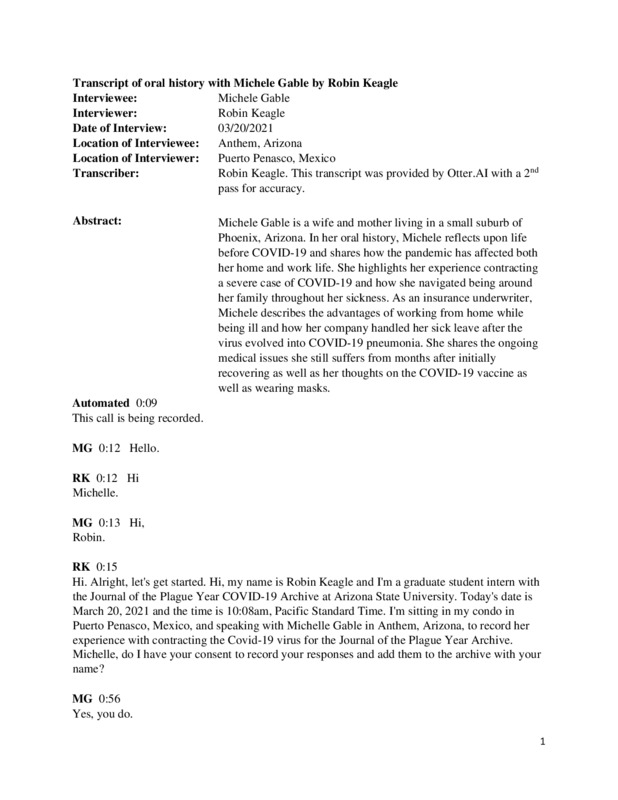
2021-03-20
Michele Gable is a wife and mother living in a small suburb of Phoenix, Arizona. In her oral history, Michele reflects upon life before COVID-19 and shares how the pandemic has affected both her home and work life. She highlights her experience contracting a severe case of COVID-19 and how she navigated being around her family throughout her sickness. As an insurance underwriter, Michele describes the advantages of working from home while being ill and how her company handled her sick leave after the virus evolved into COVID-19 pneumonia. She shares the ongoing medical issues she still suffers from months after initially recovering as well as her thoughts on the COVID-19 vaccine as well as wearing masks.
-
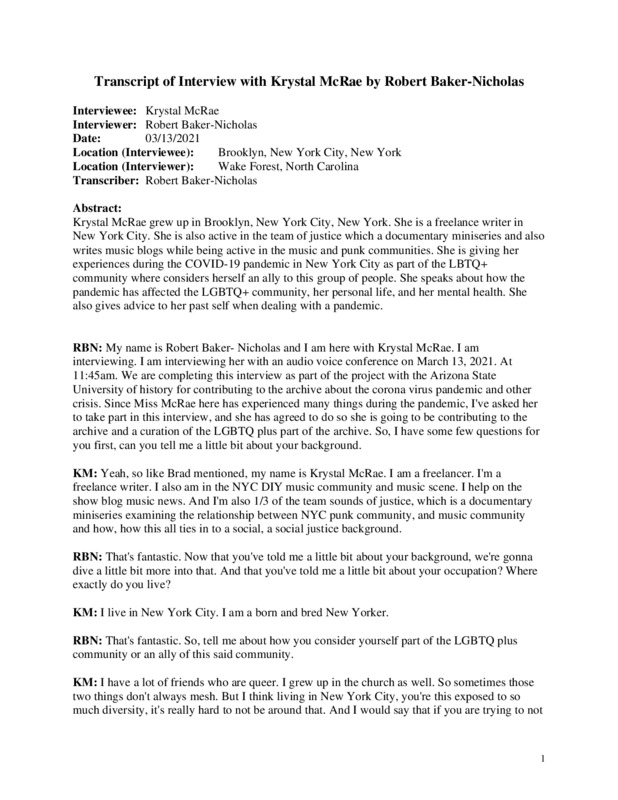
03/13/2021
Interview with Krystal McRae
-
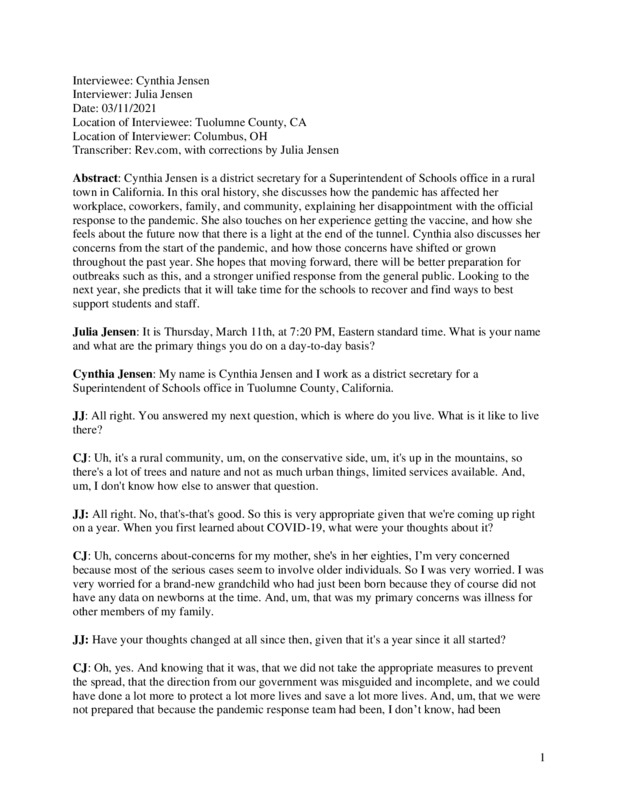
2021-03-11
Cynthia Jensen is an executive secretary for a Superintendent of Schools office in a rural town in California. In this oral history, she discusses how the pandemic has affected her workplace, coworkers, family, and community, explaining her disappointment with the official response to the pandemic. She also touches on her experience getting the vaccine, and how she feels about the future now that there is a light at the end of the tunnel. Cynthia also discusses her concerns from the start of the pandemic, and how those concerns have shifted or grown throughout the past year. She hopes that moving forward, there will be better preparation for outbreaks such as this, and a stronger unified response from the general public. Looking to the next year, she predicts that it will take time for the schools to recover and find ways to best support students and staff.
-
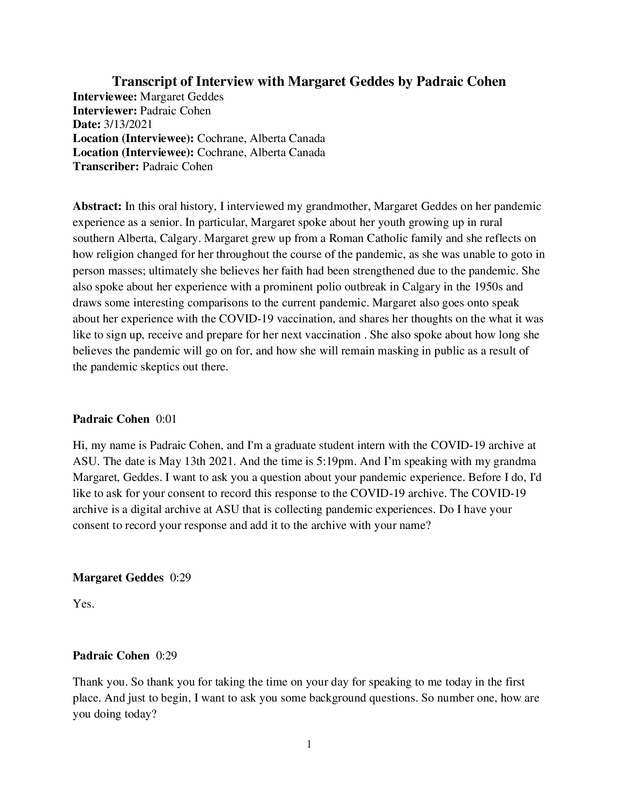
03/13/2021
Interviwee Name: Margaret Geddes
Interviewer name: Padraic Cohen
Date of Interview: 3/13/2021
Location: Cochrane, Alberta Canada.
Transcriber: Otter.ai + edits from Padraic Cohen
Abstract: In this oral history, I interviewed my grandmother, Margaret Geddes on her pandemic experience as a senior. In particular, Margaret spoke about her youth growing up in rural southern Alberta, Calgary. Margaret grew up from a Roman Catholic family and she reflects on how religion changed for her throughout the course of the pandemic, as she was unable to goto in person masses; ultimately she believes her faith had been strengthened due to the pandemic. She also spoke about her experience with a prominent polio outbreak in Calgary in the 1950s and draws some interesting comparisons to the current pandemic. Margaret also goes onto speak about her experience with the COVID-19 vaccination, and shares her thoughts on the what it was like to sign up, receive and prepare for her next vaccination . She also spoke about how long she believes the pandemic will go on for, and how she will remain masking in public as a result of the pandemic skeptics out there.
-
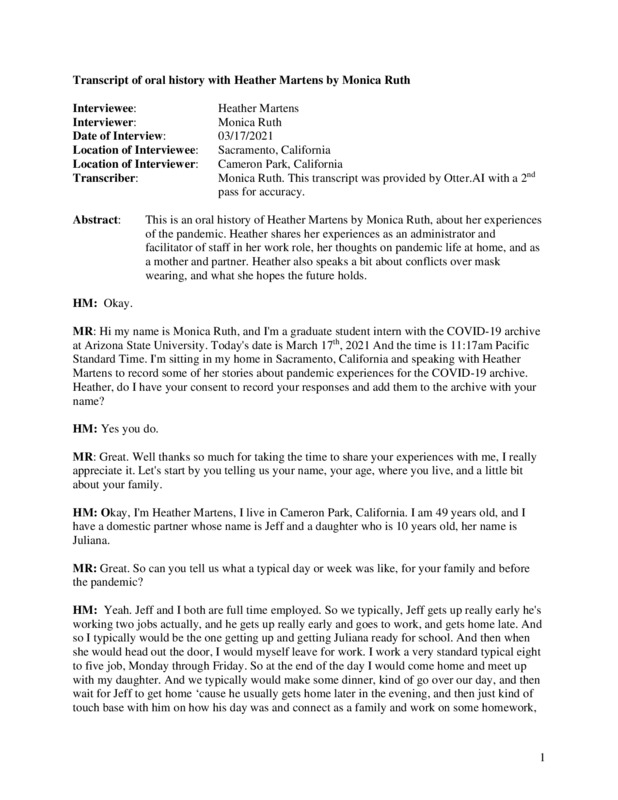
03/17/2021
This is an oral history of Heather Martens by Monica Ruth, about her experiences of the pandemic. Heather shares her experiences as an administrator and facilitator of staff in her work role, her thoughts on pandemic life at home, and as a mother and partner. Heather also speaks a bit about conflicts over mask wearing, and what she hopes the future holds.
-
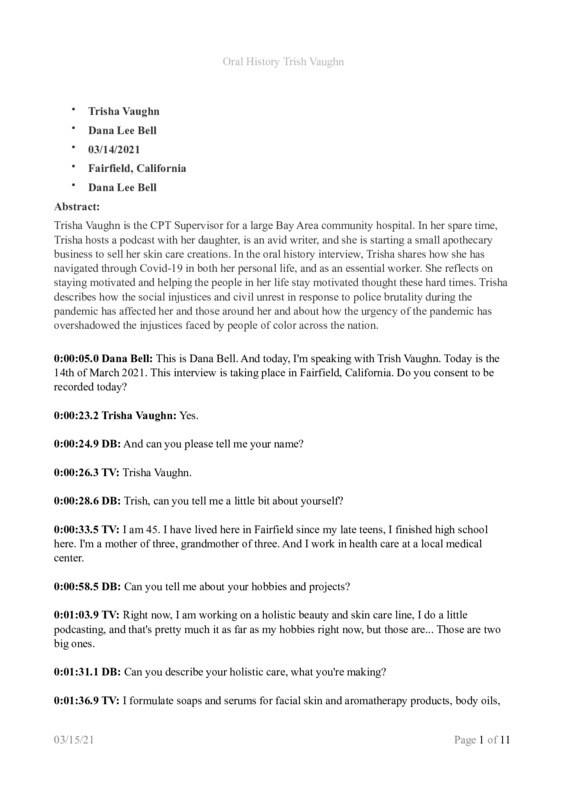
03/14/2021
Trisha Vaughn is the CPT Supervisor for a large Bay Area community hospital. In her spare time, Trisha hosts a podcast with her daughter, is an avid writer, and she is starting a small apothecary business to sell her skin care creations. In the oral history interview, Trisha shares how she has navigated through Covid-19 in both her personal life, and as an essential worker. She reflects on staying motivated and helping the people in her life stay motivated thought these hard times. Trisha describes how the social injustices and civil unrest in response to police brutality during the pandemic has affected her and those around her and about how the urgency of the pandemic has overshadowed the injustices faced by people of color across the nation.
-
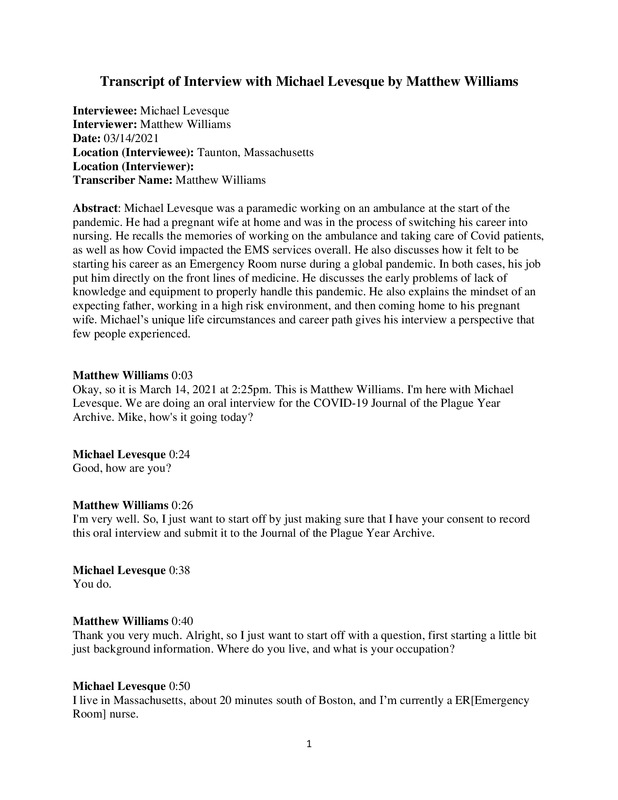
03/14/2021
Michael Levesque was a paramedic working on an ambulance at the start of the pandemic. He had a pregnant wife at home and was in the process of switching his career into nursing. He recalls the memories of working on the ambulance and taking care of Covid patients, as well as how Covid impacted the EMS services overall. He also discusses how it felt to be starting his career as an Emergency Room nurse during a global pandemic. In both cases, his job put him directly on the front lines of medicine. He discusses the early problems of lack of knowledge and equipment to properly handle this pandemic. He also explains the mindset of an expecting father, working in a high risk environment, and then coming home to his pregnant wife. Michael’s unique life circumstances and career path gives his interview a perspective that few people experienced.
-
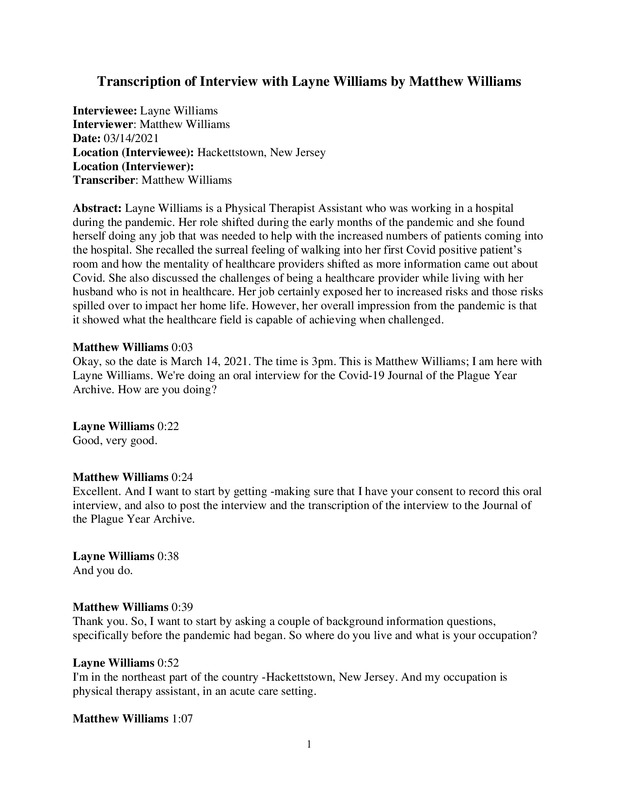
03/14/2021
Layne Williams is a Physical Therapist Assistant who was working in a hospital during the pandemic. Her role shifted during the early months of the pandemic and she found herself doing any job that was needed to help with the increased numbers of patients coming into the hospital. She recalled the surreal feeling of walking into her first Covid positive patient’s room and how the mentality of healthcare providers shifted as more information came out about Covid. She also discussed the challenges of being a healthcare provider while living with her husband who is not in healthcare. Her job certainly exposed her to increased risks and those risks spilled over to impact her home life. However, her overall impression from the pandemic is that it showed what the healthcare field is capable of achieving when challenged.
-
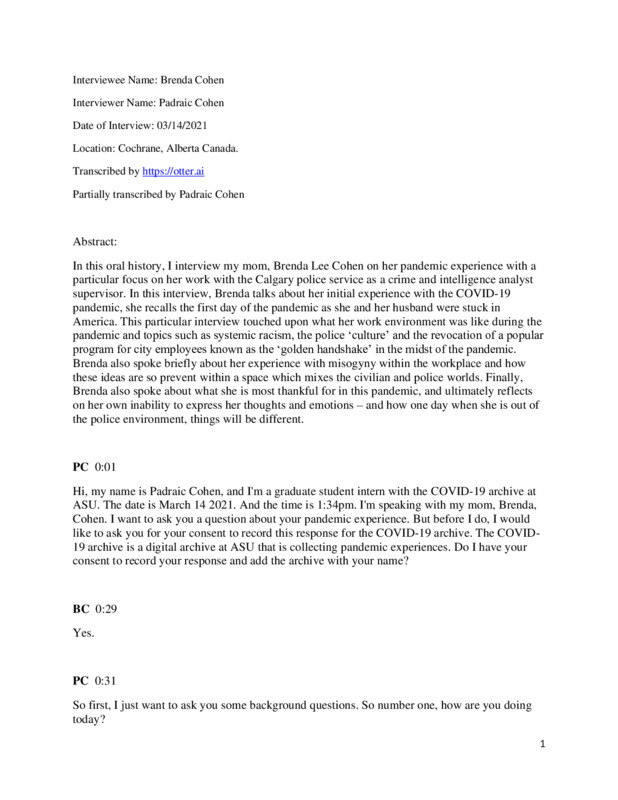
2021-03-14
In this oral history, I interview my mom, Brenda Lee Cohen on her pandemic experience with a particular focus on her work with the Calgary police service as a crime and intelligence analyst supervisor. In this interview, Brenda talks about her initial experience with the COVID-19 pandemic, she recalls the first day of the pandemic as she and her husband were stuck in America. This particular interview touched upon what her work environment was like during the pandemic and topics such as systemic racism, the police ‘culture’ and the revocation of a popular program for city employees known as the ‘golden handshake’ in the midst of the pandemic. Brenda also spoke briefly about her experience with misogyny within the workplace and how these ideas are so prevent within a space which mixes the civilian and police worlds. Finally, Brenda also spoke about what she is most thankful for in this pandemic, and ultimately reflects on her own inability to express her thoughts and emotions – and how one day when she is out of the police environment, things will be different.
Interviewee Name: Brenda Cohen
Interviewer Name: Padraic Cohen
Date of Interview: 03/14/2021
Location: Cochrane, Alberta Canada.
Transcribed by https://otter.ai
Partially transcribed by Padraic Cohen
-

03/11/2021
“Chef” Tom Dickinson is the Culinary Instructor for Fairfield High School in Northern California. A native of Oregon, Tom shares his journey in overcoming his personal challenges as a student with Autism who was often dismissed by his educators, to becoming a beloved teacher himself. He is currently organizing the development of a comprehensive culinary program that teaches students essential life and job skills. Tom reflects of the effects Covid-19 has had on his life, community, and students. He reflects on the challenges of online learning and shares the creative ways he has tried to connect with students using technology during the pandemic.
-
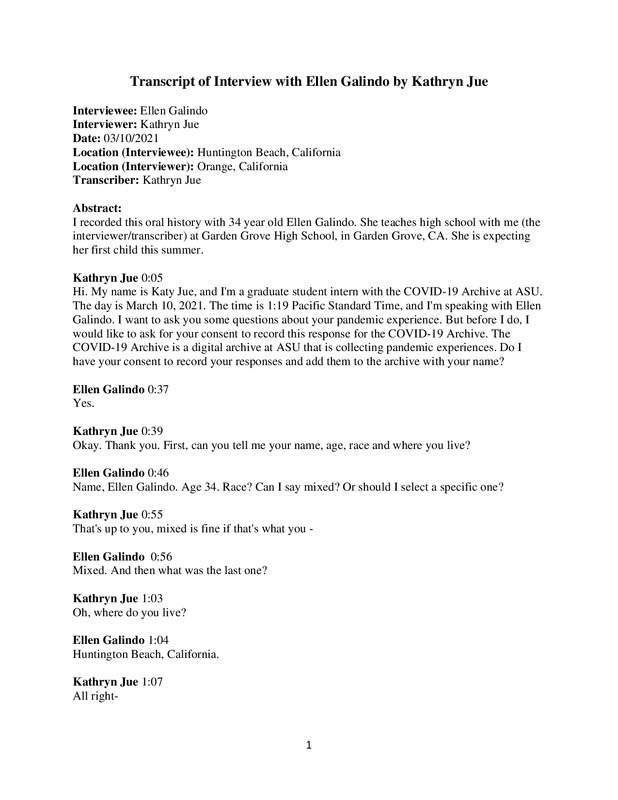
03/10/2021
This is an oral history of Ellen Galindo, a teacher in Orange County, California. The date of this interview was three days shy of the one year anniversary of when her school shut down. She has been teaching online for a year now. She is also expecting her first child. Her oral history is focused on her experience teaching through Distance Learning and her feelings on being pregnant during the pandemic.
-
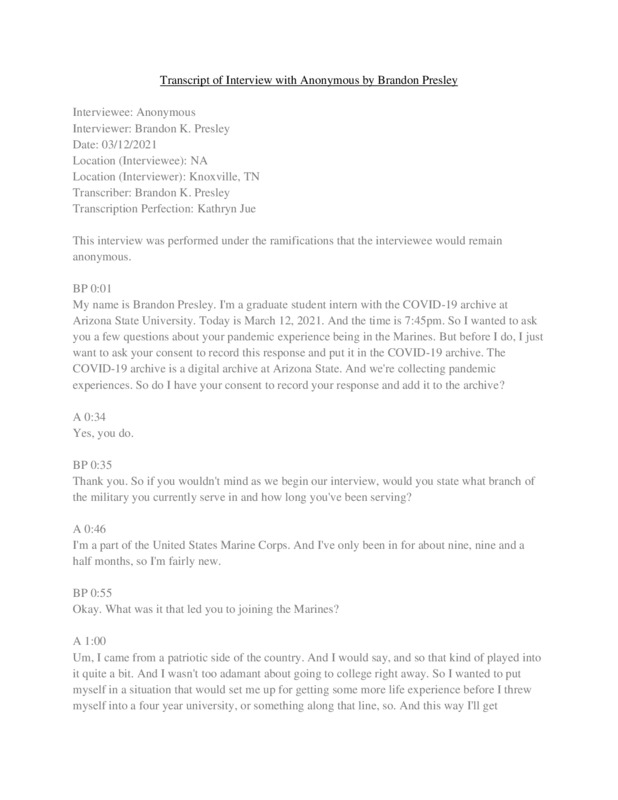
03/12/2021
Interview with a Marine that details going through Basic Training during COVID-19.
-

2021-02-27
An anonymous Bronx mother tells the story of her two daughters’ mental health challenges during the pandemic. First, her 21 year old daughter had a Covid-related panic attack in May 2020 that required 4 weeks of hospitalization. This daughter was on the road to recovery when her 24 year old daughter fell into a severe depression in August. The mother describes how this situation affected her entire family and how both daughters returned to mental health even though the pandemic hasn’t ended yet.
-
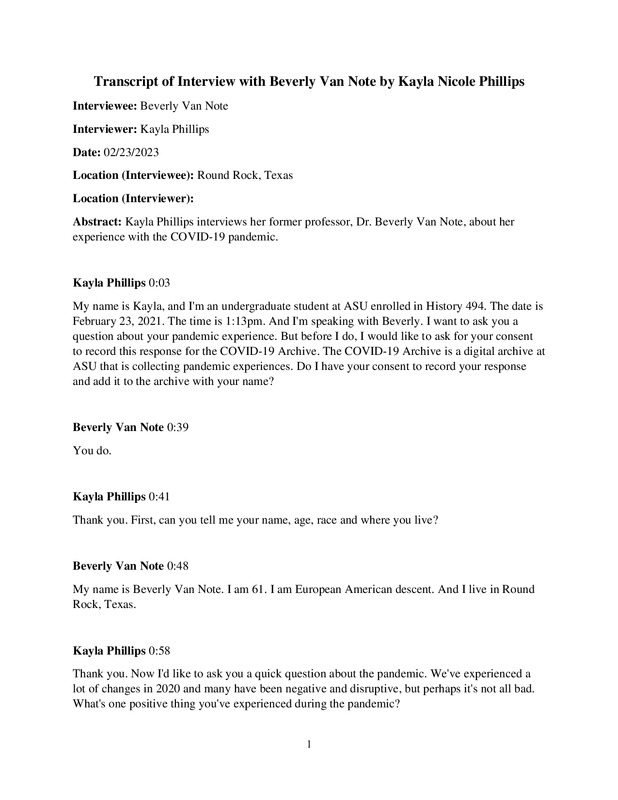
02/23/2021
I recorded a mini oral history with my former professor Dr. Beverly Van Note.
-
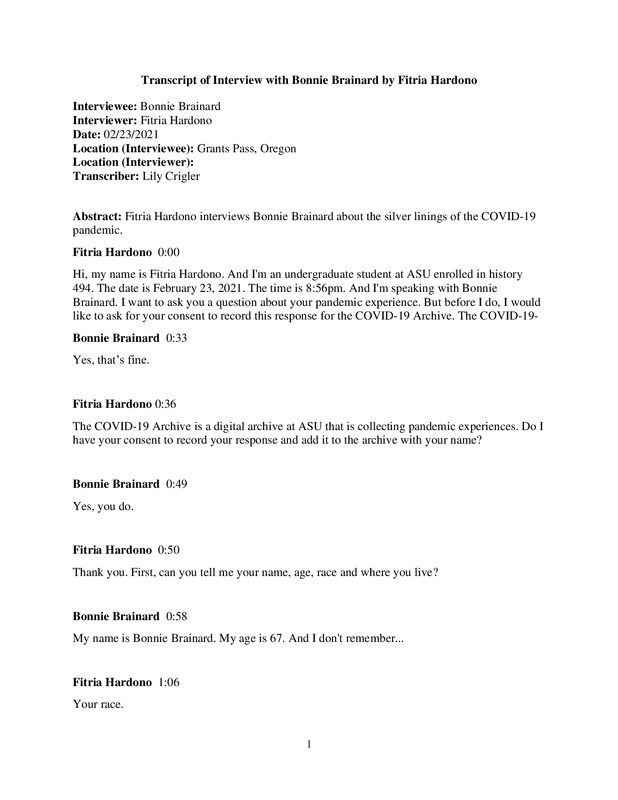
02/23/2021
I recorded a mini oral history with my former professor Dr. Beverly Van Note.
-
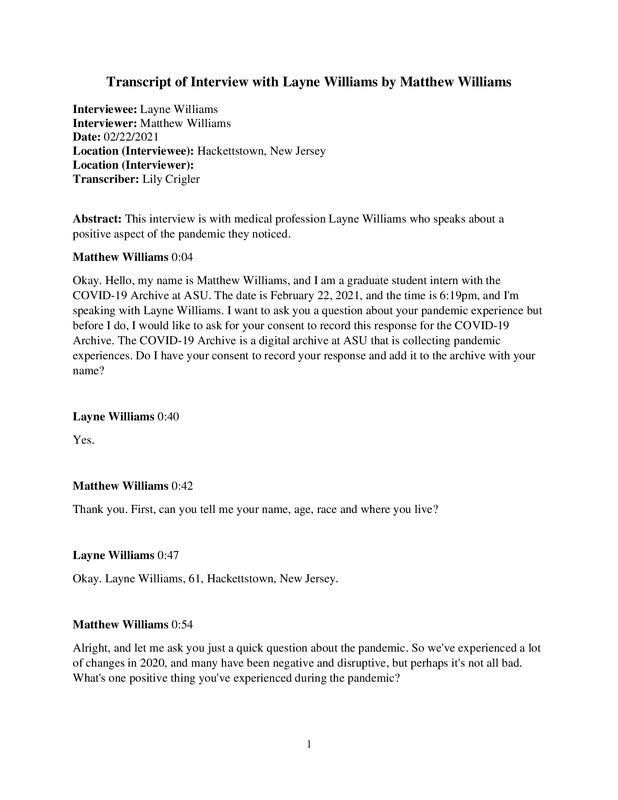
02/22/2021
This interview is with medical profession Layne Williams who speaks about a positive aspect of the pandemic they noticed.
-
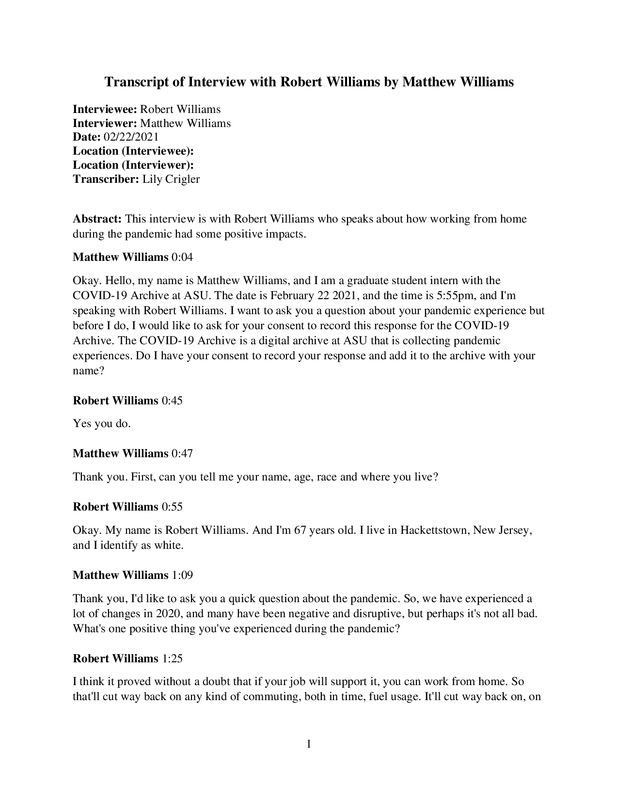
02/22/2021
This interview is with Robert Williams who speaks about how working from home during the pandemic had some positive impacts.
-
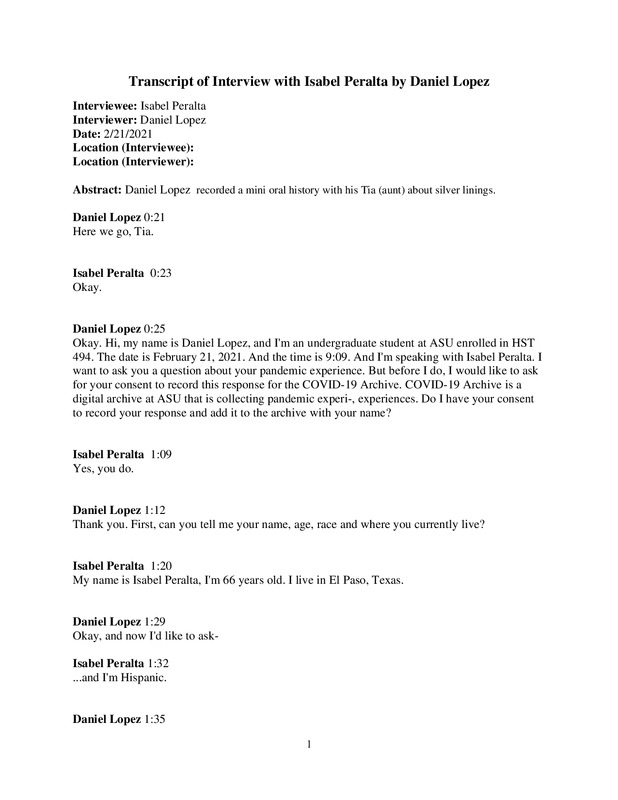
02/21/2021
I recorded a mini oral history with my Tia (aunt) about silver linings.
 2021-08-06
2021-08-06 2021-08-02
2021-08-02 2021-07-13
2021-07-13 07/25/2021
07/25/2021 2021-07-24
2021-07-24 2021-07-24
2021-07-24 2021-07-24
2021-07-24 2021-07-15
2021-07-15 07/09/2021
07/09/2021 2021-07-09
2021-07-09 07/08/2021
07/08/2021 07/08/2021
07/08/2021 2021-05-09
2021-05-09 05/03/2021
05/03/2021 05/03/2021
05/03/2021 05/11/2021
05/11/2021 05/04/2021
05/04/2021 2021-04-28
2021-04-28 2021-05-02
2021-05-02 04/21/2021
04/21/2021 2021-03-31
2021-03-31 03/31/2021
03/31/2021 03/30/2021
03/30/2021 03/30/2021
03/30/2021 2021-04-03
2021-04-03 04/03/2021
04/03/2021 03/31/2021
03/31/2021 2021-03-29
2021-03-29 2021-03-31
2021-03-31 2021-03-21
2021-03-21 2021-03-20
2021-03-20 2021-03-20
2021-03-20 03/13/2021
03/13/2021 2021-03-11
2021-03-11 03/13/2021
03/13/2021 03/17/2021
03/17/2021 03/14/2021
03/14/2021 03/14/2021
03/14/2021 03/14/2021
03/14/2021 2021-03-14
2021-03-14 03/11/2021
03/11/2021 03/10/2021
03/10/2021 03/12/2021
03/12/2021 2021-02-27
2021-02-27 02/23/2021
02/23/2021 02/23/2021
02/23/2021 02/22/2021
02/22/2021 02/22/2021
02/22/2021 02/21/2021
02/21/2021